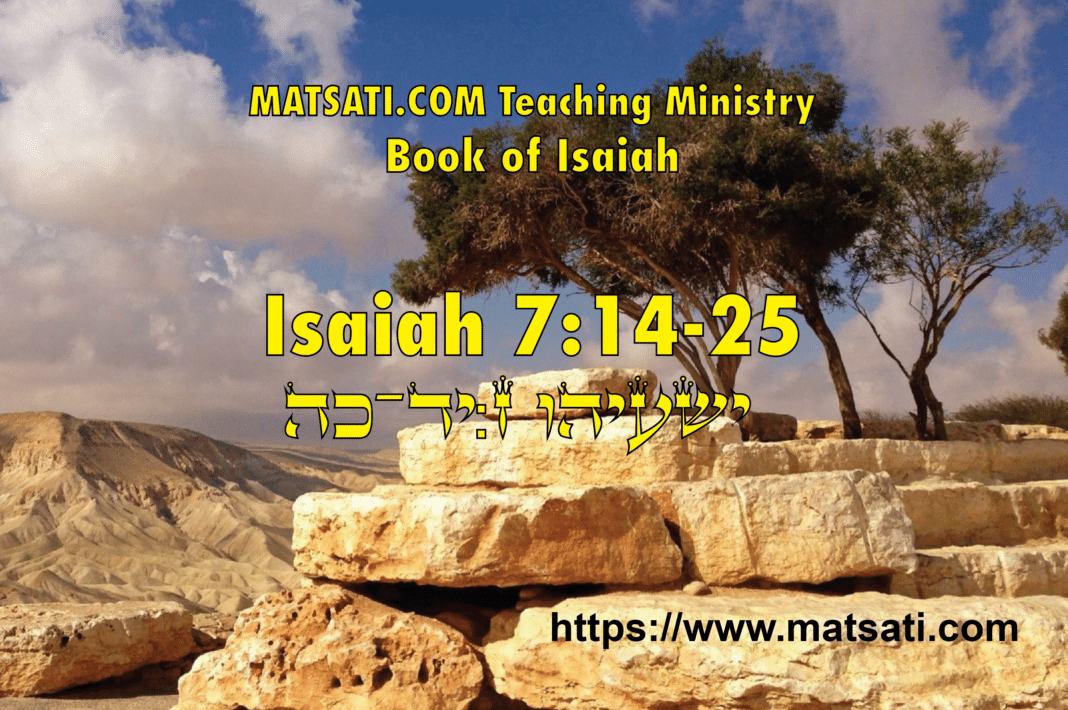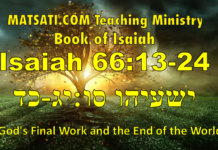Table of Contents
Introduction to Isaiah 7:14-25
Isaiah 7:14 is a verse of immense interest as the NT text according to Matthew 1:22-25 and Luke 1:26-35 uses this verse as a proof text for the Messiah of God being brought into this world through a virgin birth. It isn’t just that this verse is written into the record of the NT, but an angel of God came using this verse as the proof text.
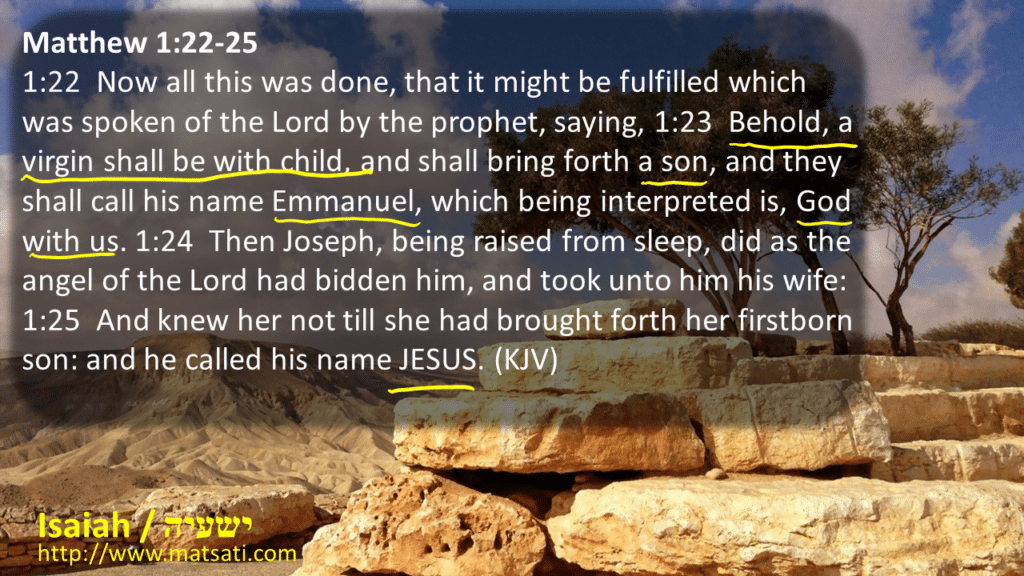
Matthew 1:22-25
1:22 Now all this was done, that it might be fulfilled which was spoken of the Lord by the prophet, saying, 1:23 Behold, a virgin shall be with child, and shall bring forth a son, and they shall call his name Emmanuel, which being interpreted is, God with us. 1:24 Then Joseph, being raised from sleep, did as the angel of the Lord had bidden him, and took unto him his wife: 1:25 And knew her not till she had brought forth her firstborn son: and he called his name JESUS. (KJV)
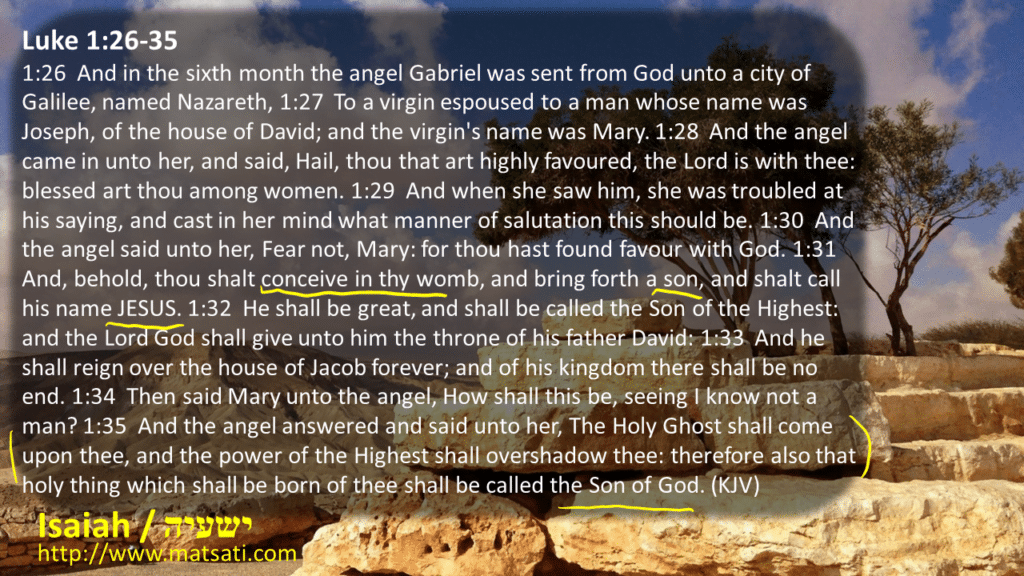
Luke 1:26-35
1:26 And in the sixth month the angel Gabriel was sent from God unto a city of Galilee, named Nazareth, 1:27 To a virgin espoused to a man whose name was Joseph, of the house of David; and the virgin’s name was Mary. 1:28 And the angel came in unto her, and said, Hail, thou that art highly favoured, the Lord is with thee: blessed art thou among women. 1:29 And when she saw him, she was troubled at his saying, and cast in her mind what manner of salutation this should be. 1:30 And the angel said unto her, Fear not, Mary: for thou hast found favour with God. 1:31 And, behold, thou shalt conceive in thy womb, and bring forth a son, and shalt call his name JESUS. 1:32 He shall be great, and shall be called the Son of the Highest: and the Lord God shall give unto him the throne of his father David: 1:33 And he shall reign over the house of Jacob forever; and of his kingdom there shall be no end. 1:34 Then said Mary unto the angel, How shall this be, seeing I know not a man? 1:35 And the angel answered and said unto her, The Holy Ghost shall come upon thee, and the power of the Highest shall overshadow thee: therefore also that holy thing which shall be born of thee shall be called the Son of God. (KJV)
The main controversy surrounding this verse is specifically on the translation of the word “virgin” as the Masoretic Text does not spell out “virgin” in the text itself. The focus by both scholars and anti-missionaries is related to the LXX translation παρθένος (parthenos, virgin) with arguments made against the LXX translation or the NT text being given a negative light for its quoting of the LXX in these scriptures as opposed to the Masoretic Text. Other attempts have been made to identify this child based upon the context of Isaiah 7 following verse 14. Scholars in general reject the idea that Isaiah 7:14 was prophetic of Yeshua’s virgin birth. Most scholars claim this question has been answered and is discounted following their refusal to accept the idea of inspiration from God which would allow for the interpretation according to Matthew and Luke. It is important to realize that most scholars are not necessarily men of faith who believe in the inspiration of God. Some scholars say he was the son of Ahaz, and others say that he was the son of Isaiah. (see John Oswalt commentary) Others claim that no present-day child was being referred to and yet others claim there are many children who were born and would be named עִמָּנוּ אֵל (Immanuel). As we can see there is much controversy, and the interpretations are all over the place based upon this verse as a proof text concerning the birth of Yeshua the Messiah. John Calvin in his commentary claims that the child mentioned in Isaiah 7:16 is different from the one in 7:14-15. The context however does not suggest such an interpretation. One of the major issues is that of Isaiah asking Ahaz to ask for a sign from God. To say that there was no present or near future sign of a child born would lead to the difficult position that this sign that would be given did not occur. The point is that if there was no future prophetic meaning, and no present prophetic meaning, this would cause a problem for the credibility of Isaiah and would draw into question the inspiration of the entire book of Isaiah. Because of this conservative commentators choose to find a dual fulfillment, one that occurred in Ahaz’s time, and one that happened at a distant future time (i.e. First Century period). Isaiah continues speaking to Ahaz and says since you will not ask for a sign, the Lord Himself will give you a sign and he gives the sign that God will provide according to Isaiah 7:14.
ספר ישעיה פרק ז
יד לָכֵן יִתֵּן אֲדֹנָי הוּא לָכֶם אוֹת הִנֵּה הָעַלְמָה הָרָה וְיֹלֶדֶת בֵּן וְקָרָאת שְׁמוֹ עִמָּנוּ אֵל:
Isaiah 7:14 states, “Therefore the Lord Himself shall give you a sign; (לָכֵן יִתֵּן אֲדֹנָי הוּא לָכֶם אוֹת) Behold, a young maiden shall conceive, (הִנֵּה הָעַלְמָה הָרָה) and bear a son, (וְיֹלֶדֶת בֵּן) and shall call his name Immanuel. (וְקָרָאת שְׁמוֹ עִמָּנוּ אֵל)” It is interesting the text states saying, לָכֵן יִתֵּן אֲדֹנָי הוּא לָכֶם using the word לָכֶם “to you” which is a pronoun suffixed with the second person masculine plural pronoun suggesting this sign was not simply to Ahaz, but to the nation. The use of a second person masculine plural pronoun here draws into question exactly who it is that Isaiah is speaking to? Was there more than one person there with Ahaz? Could it be that this prophetic message was to the world, all of those who would read these words? Also, the text literally states that this אוֹת (sign) will be הָעַלְמָה הָרָה with the word הָרָה an adjective written in the feminine singular absolute meaning “pregnant” so this sign will be a “young maiden pregnant.” The text does not explicitly state בתולה “virgin” which is the primary source of the arguments from an anti-missionary perspective. Because of this, the text itself falls into the realm of interpretation which opens the playing field for all of the anti-missionary and scholarly disagreements. Could this have been the sign that came to Ahaz’s mind when Isaiah had asked him to ask for a sign from God? That of having children, a family to carry on his name? Faced with war this very well could have been a possibility. It is not clear however, but the sign that God gave him is that He would bring a child and the child would have a very unique name (עִמָּנוּ אֵל). It appears that Isaiah used a more generalized term הָעַלְמָה (young woman) as opposed to בתולה (virgin) for what purpose is unknown. Typically, however the word הָעַלְמָה carries with it the meaning “young women of marriageable age” which has the natural conclusion that this birth will be achieved through natural means. The point is that if Isaiah had wanted to stress the virgin status of the woman, he would have used this word בתולה as opposed to the word הָעַלְמָה. The Torah contains many instances where the word בתולה is used. (Bereshit / Genesis 24:16, Shemot / Exodus 22:15, Vayikra / Leviticus 21:14, Devarim / Deuteronomy 22:23, 22:28, and 32:25) It may be natural in a Hebrew society that an attribute of הָעַלְמָה would be that such a woman would be a virgin. When studying this verse, since the meaning of this verse is highly interpretative, it is important to look at other translations from near this time period. Both the Targum Jonathan (TgJ) and LXX are believed to have been written in antiquity around 250 BC, and the Syriac Peshitta is approximately >200 AD. Therefore, the TgJ and LXX provide us with a pre-Christian translation of this verse, and the Peshitta provides us with an early, Aramaic culture, post-Christian translation of this verse.
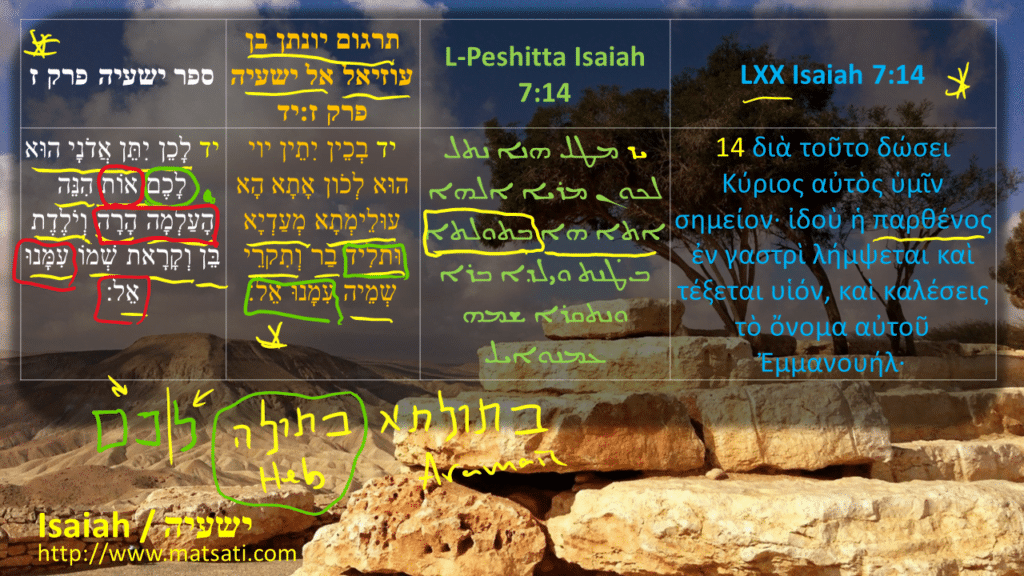
| ספר ישעיה פרק ז | תרגום יונתן בן עוזיאל אל ישעיה פרק ז:יד | L-Peshitta Isaiah 7:14 | LXX Isaiah 7:14 |
| יד לָכֵן יִתֵּן אֲדֹנָי הוּא לָכֶם אוֹת הִנֵּה הָעַלְמָה הָרָה וְיֹלֶדֶת בֵּן וְקָרָאת שְׁמוֹ עִמָּנוּ אֵל: | יד בְכֵין יִתֵין יוי הוּא לְכֹון אָתָא הָא עוּלֵימְתָא מְעַדְיָא וּתלִיד בַר וְתִקרֵי שְמֵיה עִמָנוּ אֵל׃ | ܝܖ ܡܛܠ ܗܢܐ ܢܬܠ ܠܟܘܢ ܡܪܝܐ ܐܠܗܐ ܐܬܐ ܗܐ ܒܬܘܠܬܐ ܒ̇ܛܢܬ ܘܝ̇ܠܕܐ ܒܪܐ ܘܢܬܩܪܐ ܫܡܗ ܥܡܢܘܐܝܠ | 14 διὰ τοῦτο δώσει Κύριος αὐτὸς ὑμῖν σημείον· ἰδοὺ ἡ παρθένος ἐν γαστρὶ λήμψεται καὶ τέξεται υἱόν, καὶ καλέσεις τὸ ὄνομα αὐτοῦ Ἐμμανουήλ· |
We have three different translations here, from the Targum Jonathan, from the Septuagint (LXX) and from the Leiden Peshitta. As we had discussed previously, the Targum and the Septuagint both are placed in antiquity prior to the NT period. The L-Peshitta dates a couple hundred years following the life of Yeshua. In the Aramaic Peshitta, immediately we see the post-Christian translation uses the word ܒܬܘܠܬܐ (betulta, בתולתא) which is the Aramaic equivalent of בתולה and is the word used for “virgin.” Based upon this text, some might immediately assume that there was post-Christian influence upon this translation. The idea here is the translators are adding words on top of their translation in order to further clarify the meaning. The LXX translation also does the same thing using the word παρθένος (parthenos, virgin). This may suggest that the understanding of this verse even in antiquity needed further clarification and so this word ended up in the LXX. We also know that in our modern translations, the English translations often used the LXX to translate the bible into English as the Hebrew text was many centuries ago more difficult, meaning the resources that we have today were not available. Proof of this is found in the numbering scheme when reading through the Tanakh, in many places the numbering of the English translations does not follow that of the Masoretic text. The reason being the LXX does the same thing, and so the English translators were in fact following the translation of the Scriptures from the LXX as opposed to holding strictly to the MSS. We also know that the rabbis in the first century considered the LXX as the inspired word of God. They did not consider this a lesser text as compared to the Targums. Note that this same Greek word παρθένος is used in various places in the Torah to describe virgin, the Greek word used to translate בתולה (Bereshit / Genesis 24:16, Shemot / Exodus 22:15/16 παρθένον, Vayikra / Leviticus 21:14 παρθένον, Devarim / Deuteronomy 22:23 παρθένος, 22:28 παρθένον, and 32:25 παρθένῳ). We know in the Greek MS for the NT, the authors of these texts quoted from the LXX. So the question is how much influence did the LXX have on the Peshitta translation? Modern scholarship argues over the idea of the Peshitta being a hebrew-aramaic original source text, while others claim this was simply a translation from the Greek manuscripts that we currently have.
Looking at the Targum translation, according to the English translation by C.W.H. Pauli 1871 in his book titled: “The Chaldean Paraphrase on the Book of Isaiah,” his translation states, 7:14 “Therefore the Lord Himself shall give you a sign; Behold, a virgin shall conceive, and bear a son, and she shall call His name Immanuel.” Here Pauli translates into English “virgin” but if we actually look at the Aramaic text according to the Targum we find the phrase, עוּלֵימְתָא מְעַדְיָא וּתלִיד בַר which as can be observed, the word עוּלֵימְתָא in Aramaic is very similar to and the equivalent of the Hebrew text הָעַלְמָה, TgJ is giving a word for word translation here in this instance. We do however note that additional text is provided in the Targum as compared to the MSS, עוּלֵימְתָא מְעַדְיָא וּתלִיד בַר the word וּתלִיד is written in the peal verb form meaning “to rush upon, to happen” describing something that occurs suddenly,” וּתלִיד בַר “to be pregnant with a son.” Does this suggest that “a young woman will suddenly birth a son” as in the case of a virgin being found with a child according to the LXX and Peshitta? It is important to note the use of the word הָעַלְמָה suggests from Isaiah’s perspective her virginity was not the focal point. It is interesting the sudden nature of the woman being pregnant, the focus appears to be more upon the baby as opposed to her virginity. Considering the LXX, the Hebrew scriptures were translated into Koine Greek around approximately ~250 BC. Tradition is that it was by 70 rabbis, however the who, where, and when questions still remain. The point is if Isaiah had wanted to stress the virginity of the mother, he could have used alternative language (בתולה). We note the particulars about the Hebrew language itself. Here Isaiah could have said a woman אִשָׁה would have a child. Note how אִשָׁה is the most generalized term that does not have the implications of virginity. It could be the use of the word הָעַלְמָה couples the virginity and keeping the focus upon the son that will be born who is the Messiah of God. The word הָעַלְמָה in fact does bring with it a very rich Torah based Jewish understanding, Torah richness and diversity. John Oswalt states “The Ugaritic cognate (ǵlmt) is used with reference to a goddess who was understood to be a perpetual virgin…” So the idea was that some people believe Isaiah was simply adopting a local pagan belief in his statement to King Ahaz. John Oswalt continues saying, “one may still think that Isaiah adapted well-known linguistic forms which would make it plain that whatever might occur along the way, the ultimate fulfillment of this prophecy would be no ordinary event.” We note the weightiness of this interpretation that the focus is upon the child, as the next few chapters speak on the theme of the child king.
The point is Isaiah revealing to Ahaz that God is present and able to do anything, even to cause Ephraim and Syria to disappear, even in the midst of Ahaz sinning in his seeking help from Assyria. Rashi states the following concerning Isaiah 7:14.
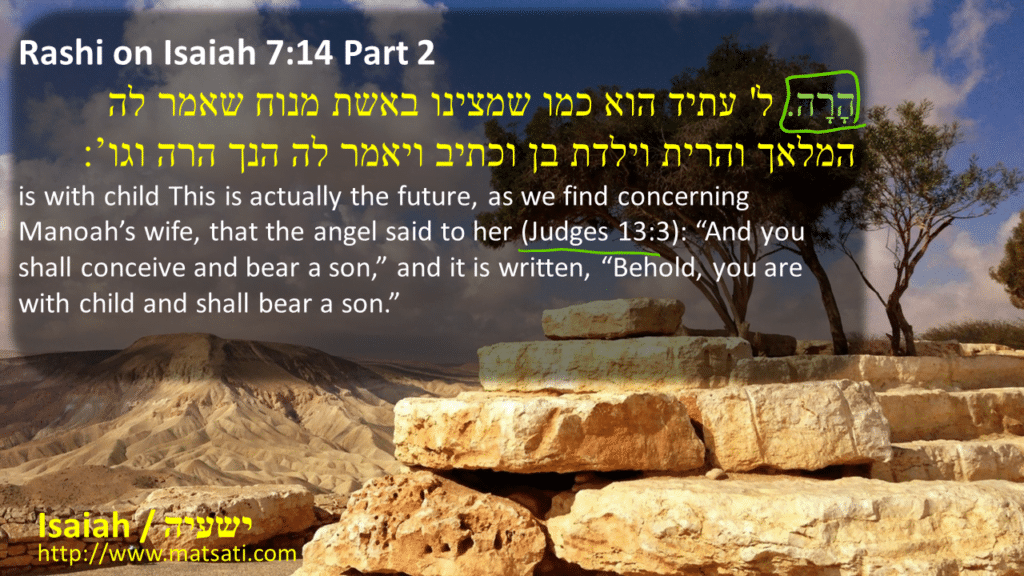
Rashi on Isaiah 7:14 Part 2
is with child This is actually the future, as we find concerning Manoah’s wife, that the angel said to her (Judges 13:3): “And you shall conceive and bear a son,” and it is written, “Behold, you are with child and shall bear a son.”
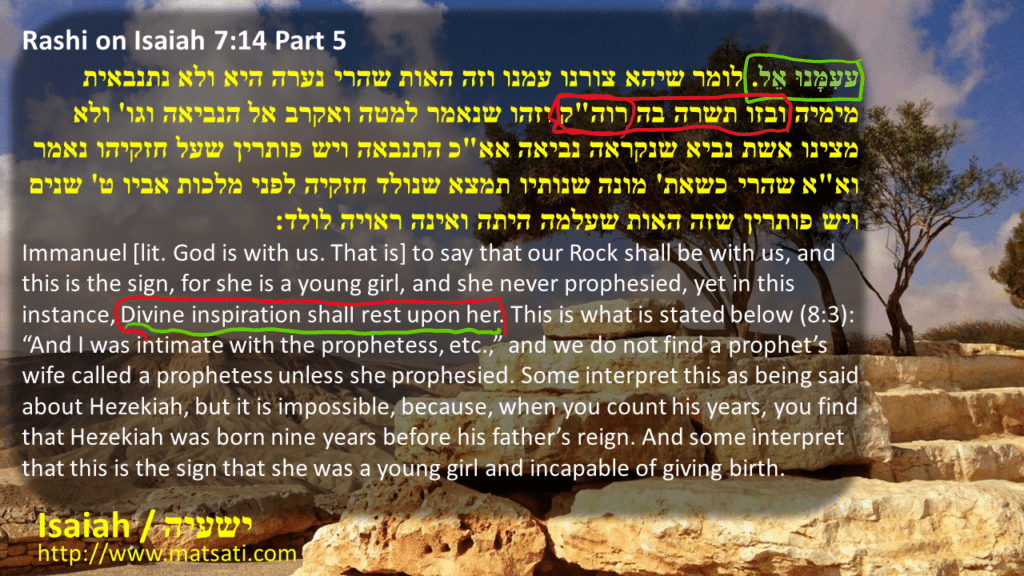
Rashi on Isaiah 7:14 Part 5
עמנו אל. לומר שיהא צורנו עמנו וזה האות שהרי נערה היא ולא נתנבאית מימיה ובזו תשרה בה רוה”ק וזהו שנאמר למטה ואקרב אל הנביאה וגו’ ולא מצינו אשת נביא שנקראה נביאה אא”כ התנבאה ויש פותרין שעל חזקיהו נאמר וא”א שהרי כשאת’ מונה שנותיו תמצא שנולד חזקיה לפני מלכות אביו ט’ שנים ויש פותרין שזה האות שעלמה היתה ואינה ראויה לולד:
Immanuel [lit. God is with us. That is] to say that our Rock shall be with us, and this is the sign, for she is a young girl, and she never prophesied, yet in this instance, Divine inspiration shall rest upon her. This is what is stated below (8:3): “And I was intimate with the prophetess, etc.,” and we do not find a prophet’s wife called a prophetess unless she prophesied. Some interpret this as being said about Hezekiah, but it is impossible, because, when you count his years, you find that Hezekiah was born nine years before his father’s reign. And some interpret that this is the sign that she was a young girl and incapable of giving birth.
According to part 2 and 5 of Rashi’s commentary, his assessment of the meaning of Isaiah 7:14 is that this event with the child is at a future time. The example of Manoah’s wife is given. Rashi holds no position in particular upon the virgin birth as he does not comment on this interpretation as others due (i.e. Ibn Ezra). The name עִמָּנוּ אֵל (Emmanuel) carries with it the meaning that God is with us, Rashi describes as “our Rock” (Tehillim / Psalms 18:2). Throughout scripture, the Rock was commonly referred to as a symbol of God’s reliability. The Bible advises that we build our houses and lives upon the stable rock that is upon faith in the Lord God and upon His Holy Word! Rocks are interlaced with the idea of refuge, a place to escape this tumultuous and dangerous world. Here it is interesting how Rashi speaks of the maiden הָעַלְמָה spoken of in the text as not having prophesied yet. This is compared to the prophetess, a female prophet, when she prophesies, it is apparent that the Divine presence is upon her giving her inspiration. Here this הָעַלְמָה (maiden) was not just young, but also not a prophet, and yet the Divine presence of God rested upon her. Note something that Rashi states, he says ובזו תשרה בה רוה”ק where רוה״ק = רוח הקדש (Holy Spirit) saying that the Spirit of God will rest upon her. This is consistent with the NT interpretation by the angel Gabriel. The Talmud reference has an extended discussion on the name Emmanuel according to the Talmud Bavli Soferim 4:8.
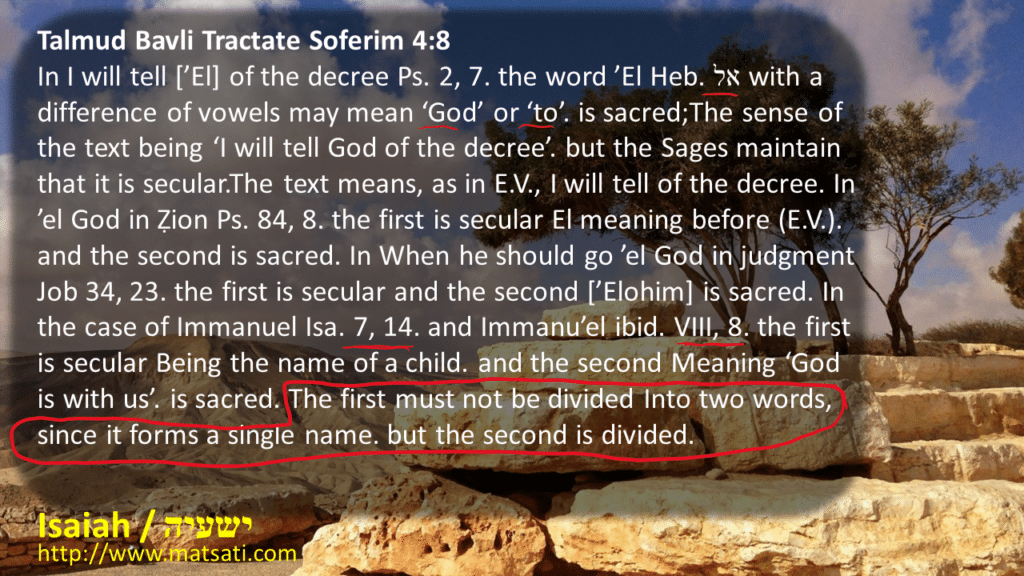
Talmud Bavli Tractate Soferim 4:8
In I will tell [’El] of the decree Ps. 2, 7. the word ’El51Heb. אל with a difference of vowels may mean ‘God’ or ‘to’. is sacred;The sense of the text being ‘I will tell God of the decree’. but the Sages maintain that it is secular.The text means, as in E.V., I will tell of the decree. In ’el God in Ẓion Ps. 84, 8. the first is secular El meaning before (E.V.). and the second is sacred. In When he should go ’el God in judgment Job 34, 23. the first is secular and the second [’Elohim] is sacred. In the case of Immanuel Isa. 7, 14. and Immanu’el ibid. VIII, 8. the first is secular Being the name of a child. and the second Meaning ‘God is with us’. is sacred. The first must not be divided Into two words, since it forms a single name. but the second is divided.
The talmudic discussion is around the word אל (God, singular) VS אֱלֹהִים (God, plural). Based on this discussion it seems that there were those who did not believe this reference to “God with us” (עִמָּנוּ אֵל) the word El was sacred. Various proof texts are given going back and forth showing how אל (God, singular) was sacred and also אֱלֹהִים (God, plural) was sacred, and so the conclusion here is in the word עִמָּנוּ אֵל the word אל (God, singular) was sacred and how the name was not to be divided as עִמָּנוּ אֵל is the name of this unborn boy. “God with us” therefore couples the idea of the Divine presence being with us, consistent with Rashi’s interpretation. Midrash Rabbah on Shemot Parashat 18, Part 5 states the following concerning these things.
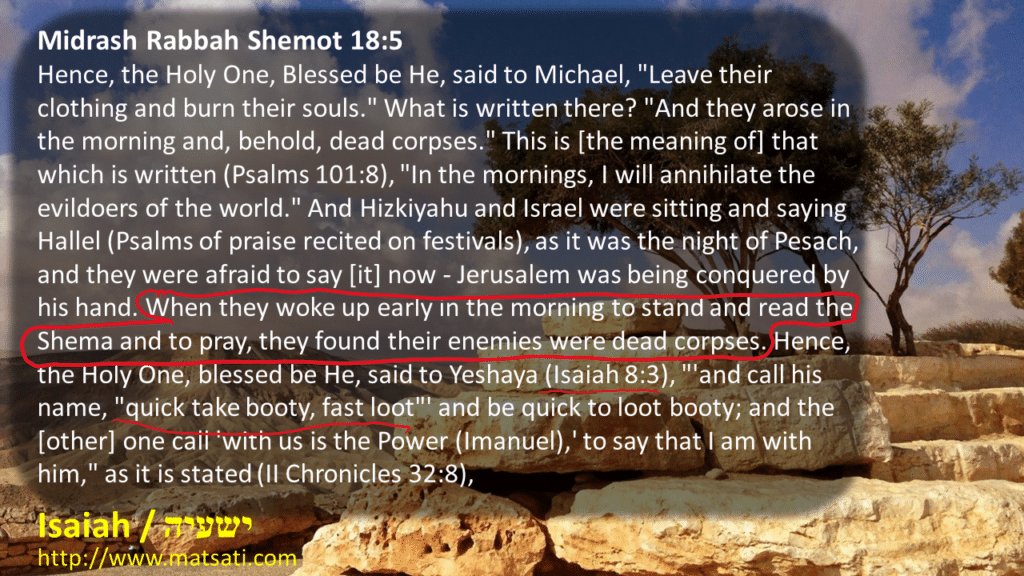
Midrash Rabbah Shemot 18:5
Hence, the Holy One, Blessed be He, said to Michael, “Leave their clothing and burn their souls.” What is written there? “And they arose in the morning and, behold, dead corpses.” This is [the meaning of] that which is written (Psalms 101:8), “In the mornings, I will annihilate the evildoers of the world.” And Hizkiyahu and Israel were sitting and saying Hallel (Psalms of praise recited on festivals), as it was the night of Pesach, and they were afraid to say [it] now – Jerusalem was being conquered by his hand. When they woke up early in the morning to stand and read the Shema and to pray, they found their enemies were dead corpses. Hence, the Holy One, blessed be He, said to Yeshaya (Isaiah 8:3), “‘and call his name, “quick take booty, fast loot”‘ and be quick to loot booty; and the [other] one call ‘with us is the Power (Imanuel),’ to say that I am with him,” as it is stated (II Chronicles 32:8),
Midrash Rabbah picks up on the narrative of when God had destroyed the army of sennacherib according to 2 Kings 19:35-37. God had given Hezikiah a sign by the destruction of the enemy. This is paralleled to Ahaz’s situation and the Midrash says this is the power of Emmanuel, God with us. Note how the miracle of God that is being paralleled here is to a people who are faithful per the midrashic statement “When they woke up early in the morning to stand and read the Shema and to pray, they found their enemies were dead corpses.” The idea is that these concepts may all be drawn out of this one verse and the sign that is being given to Ahaz. Ibn Ezra states the following concerning his commentary.

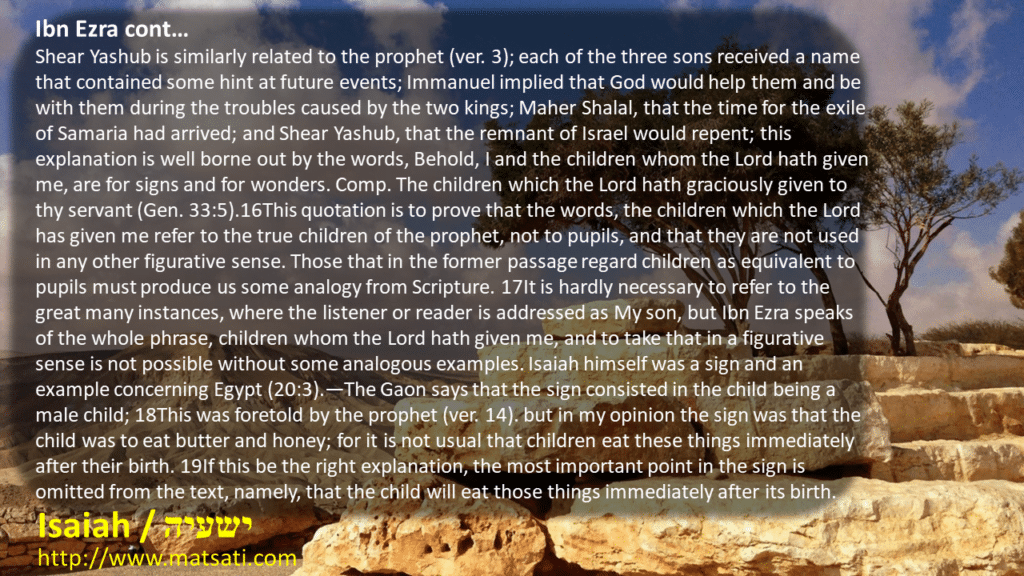
Ibn Ezra on Isaiah 7:14 Part 1
Therefore the Lord himself etc. Though you do not ask for a sign, He will give it to you. It is to me a matter of surprise that there are those who say the prophet here refers to Jesus, since the sign was given to Ahaz, and Jesus was born many years afterwards; besides, the prophet says, For before the child shall know to refuse the evil and choose the good, the land shall be forsaken; but the countries of Ephraim and Syria were wasted in the sixth year of Hezekiah, and 15The following is added to show that The land shall be forsaken, can only refer to Syria and Israel; both kingdoms were successively conquered by Assyria in the time of Ahaz and Hezekiah. it is distinctly said of whose two kings, etc. Many make the mistake of identifying Immanuel with Hezekiah; they cannot be the same, granting even this prophecy to have been uttered at the beginning of the reign of Ahaz; he reigned only sixteen years, and Hezekiah was at the death of Ahaz twenty-five years old. According to others, Immanuel is another son of Ahaz, and others again take the names (Immanuel, Maher Shalal and Shear Yashub) as symbolical of the kingdom; but if so, what meaning would be in the child’s knowing good and evil and in Maher Shalal calling father and mother? (8:4). I think that Immanuel is the son of Isaiah, as well as Maher Shalal; the latter is proved by And I went unto the prophetess, etc. (8:3). Shear Yashub is similarly related to the prophet (ver. 3); each of the three sons received a name that contained some hint at future events; Immanuel implied that God would help them and be with them during the troubles caused by the two kings; Maher Shalal, that the time for the exile of Samaria had arrived; and Shear Yashub, that the remnant of Israel would repent; this explanation is well borne out by the words, Behold, I and the children whom the Lord hath given me, are for signs and for wonders. Comp. The children which the Lord hath graciously given to thy servant (Gen. 33:5).16This quotation is to prove that the words, the children which the Lord has given me refer to the true children of the prophet, not to pupils, and that they are not used in any other figurative sense. Those that in the former passage regard children as equivalent to pupils must produce us some analogy from Scripture. 17It is hardly necessary to refer to the great many instances, where the listener or reader is addressed as My son, but Ibn Ezra speaks of the whole phrase, children whom the Lord hath given me, and to take that in a figurative sense is not possible without some analogous examples. Isaiah himself was a sign and an example concerning Egypt (20:3).—The Gaon says that the sign consisted in the child being a male child; 18This was foretold by the prophet (ver. 14). but in my opinion the sign was that the child was to eat butter and honey; for it is not usual that children eat these things immediately after their birth. 19If this be the right explanation, the most important point in the sign is omitted from the text, namely, that the child will eat those things immediately after its birth.
So Ibn Ezra explicitly states that he does not believe the prophecy by Isaiah referred to Yeshua (Jesus). His reasoning is that Yeshua was born many years later. Ibn Ezra doesn’t believe there is a dual prophetic meaning to the text. In fact, this is a common anti-missionary approach when confronted with a messianic prophecy in the scriptures. The tactic is generally pointing towards more recent history, referring to Ahaz’s time frame. Ibn Ezra calls upon the scriptures flowing from Isaiah 7:14 saying, “For before the child shall know to refuse the evil and choose the good, the land shall be forsaken,” the more recent future expectation. He goes on saying, “The children which the Lord hath graciously given to thy servant (Gen. 33:5)” and then claims the prophet Isaiah himself was the sign and example where Emmanuel was Isaiah’s son. His conclusion was that the name Emmanuel implied God would help them and be with them during their troubles. This is related to the faithfulness of God to His people and His presence being with his people at all times. The הָעַלְמָה (maiden) being found with child and naming her son עִמָּנוּ אֵל (Emmanuel) is the way in which the Lord will be with His people by a Messianic King. It is important to understand how the sign Isaiah gives is focusing upon the appearance of the baby, and the name of the baby. The focus is primarily upon the baby, not the woman, which is an important observation history bears out and even today the catholic church has errored drastically focusing more upon the woman as opposed to the child. The custom of the mother naming her child is attested in the Tanakh according to Bereshit / Genesis 4:1, 4:25 29:31-30:13, 30:17-24, 35:18, Judges 13:24, 1 Samuel 1:20 and 4:21. The point of deemphasizing the male (fatherly) role may be the reason we find the LXX translating the text with בתולה (virgin). The absence of mentioning a human father may be the point of the child’s name “God with us.” The difficulty finding the child in the near future fulfillment causes this prophecy to be very mysterious. We note that even the NT account does not explicitly identify Yeshua’s father’s identity but speaks of the Holy Spirit of God and the Divine presence of God rested upon her and to her then being found with child, consistent with Rashi’s assessment on the interpretation of this verse. There is a significant point being made here concerning the idea of the prophetic sign only focusing upon the child. All of these questions regarding the identity of the child reveals to us that it is possible the mystery was something to be revealed at a future date. Remember what happened with the disciples, following the death, burial, and resurrection of Yeshua. The disciples did not understand the point of Yeshua’s death and the meaning of scriptures on how all of these things were spoken of and why prophecy needed to come true in this particular way! According to Luke 24:45 we read, “Then he opened their minds so they could understand the Scriptures.” Based upon this NT text, Yeshua needed to give the disciples the ability to understand what is written in the Scriptures. With the same line of thought, it could be that the Angel Gabriel came to Mary and Joseph to explain the meaning of this verse from Isaiah (7:14) and the identity of the child. This may be the whole point of shrouding the child in mystery. The analysis of Isaiah 7:14 does not lead to disbelief in the sign from God as referring to the Messiah. Neither do the rabbis place any kind of definitive answer as to whether or not Isaiah 7:14 was for or against referring to Yeshua. The main conclusion is those who argue against this interpretation are holding to a presupposition that leads to unbelief. This is a significant point because it speaks to faith, and that we are to have faith in the written record that God has given us, from Bereshit / Genesis to Revelation! Without faith there is no understanding, which leads then to further confusion and walking away from what God wants for our lives, to believe in His Son Yeshua, to draw near to our Father in heaven, and to seek the power and the presence of God’s Spirit in our lives! Without these things, living in obedience to God’s Word becomes an impossible thing to do!
Isaiah continues saying the following according to Isaiah 7:15.
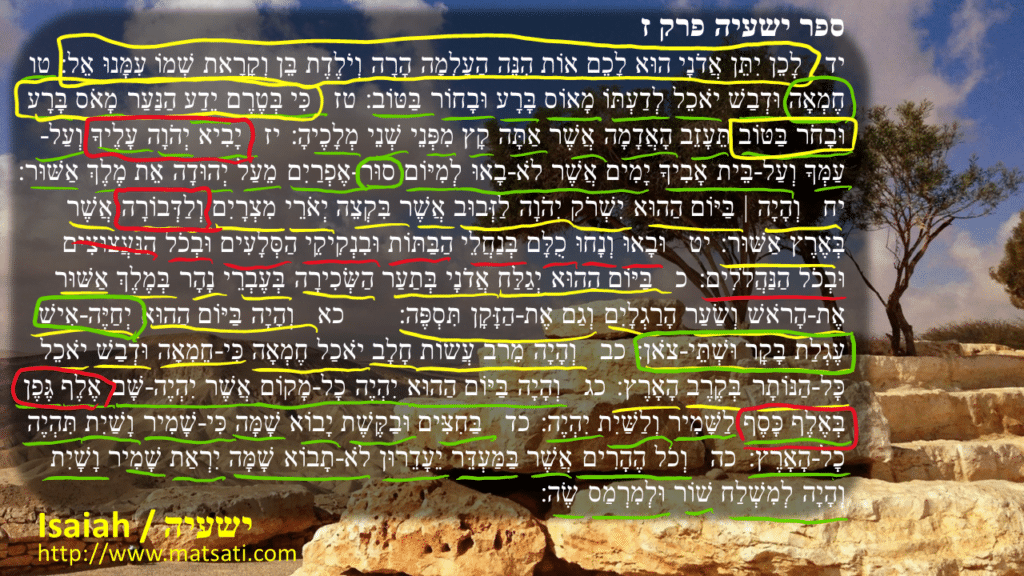
ספר ישעיה פרק ז
טו חֶמְאָה וּדְבַשׁ יֹאכֵל לְדַעְתּוֹ מָאוֹס בָּרָע וּבָחוֹר בַּטּוֹב:
Isaiah 7:15 states, “Butter and honey shall he eat, (חֶמְאָה וּדְבַשׁ יֹאכֵל) that he may know to refuse the evil, (לְדַעְתּוֹ מָאוֹס בָּרָע) and choose the good. (וּבָחוֹר בַּטּוֹב)” Reading this verse immediately reminds us of Cholesterol in the mention of butter and honey and the good and the bad. Our scientific knowledge today reveals that LDL cholesterol is considered “bad” because it contributes to fatty buildups in arteries (atherosclerosis). HDL cholesterol on the other hand is thought of as “good” because a healthy level may protect against heart attack and stroke. Here Isaiah is setting up the idea that we can either make good choices or bad. The Torah perspective of this statement חֶמְאָה וּדְבַשׁ יֹאכֵל reminds us of חָלָב֙ וּדְבַ֔שׁ “milk and honey.” The Torah describes blessing in the form of חָלָב֙ וּדְבַ֔שׁ where God promises to bring the people into a place, into a land, filled with milk and honey. Some of the greatest Jewish Sages asked the question why חָלָב֙ וּדְבַ֔שׁ? We find this statement for example at the burning bush (Shemot / Exodus 3) when God spoke to Moshe, He informed Moshe that He would redeem Israel, carry the people out of bondage and slavery, and bring them to a “good and spacious land, a land flowing with milk and honey…” We note that there is a quality about חָלָב֙ וּדְבַ֔שׁ which share the concept of kosher foods. Honey is kosher though it comes from an on-kosher insect, and milk is kosher though it comes from a cow, however the meat of a cow may not be eaten with the milk, but milk and honey are allowed to be eaten together. Butter (חֶמְאָה) may also come from a non-kosher source and is interpreted in parallel to evil as describing the difference between what is helpful and what is harmful. These things are connected to Syria and Ephraim, and Judah and Jerusalem, there is a balance of discernment between good and evil, right and wrong. Even a child is able to discern between what is right (listening to his or her parent) or living in disobedience. Before the child comes to the age of accountability, he will have an understanding of these things.
ספר ישעיה פרק ז
טז כִּי בְּטֶרֶם יֵדַע הַנַּעַר מָאֹס בָּרָע וּבָחֹר בַּטּוֹב תֵּעָזֵב הָאֲדָמָה אֲשֶׁר אַתָּה קָץ מִפְּנֵי שְׁנֵי מְלָכֶיהָ: יז יָבִיא יְהֹוָה עָלֶיךָ וְעַל-עַמְּךָ וְעַל-בֵּית אָבִיךָ יָמִים אֲשֶׁר לֹא-בָאוּ לְמִיּוֹם סוּר-אֶפְרַיִם מֵעַל יְהוּדָה אֵת מֶלֶךְ אַשּׁוּר:
Isaiah 7:16 states, “For before the child shall know to refuse the evil, (כִּי בְּטֶרֶם יֵדַע הַנַּעַר מָאֹס בָּרָע) and choose the good, (וּבָחֹר בַּטּוֹב) the land that thou abhorrest shall be forsaken of both her kings. (תֵּעָזֵב הָאֲדָמָה אֲשֶׁר אַתָּה קָץ מִפְּנֵי שְׁנֵי מְלָכֶיהָ)” Isaiah 7:17 “The LORD shall bring upon thee, (יָבִיא יְהֹוָה עָלֶיךָ) and upon thy people, (וְעַל-עַמְּךָ) and upon thy father’s house, (וְעַל-בֵּית אָבִיךָ) days that have not come, (יָמִים אֲשֶׁר לֹא-בָאוּ) from the day that Ephraim departed from Judah; even the king of Assyria. (לְמִיּוֹם סוּר-אֶפְרַיִם מֵעַל יְהוּדָה אֵת מֶלֶךְ אַשּׁוּר)” We note that the real world application of this idea כִּי בְּטֶרֶם יֵדַע הַנַּעַר מָאֹס בָּרָע וּבָחֹר בַּטּוֹב “For before the child shall know to refuse the evil, and choose the good” is that a child needs discipline in order to understand the difference and make the correct choice. We note that Isaiah 7:17 speaks saying, יָבִיא יְהֹוָה עָלֶיךָ “The LORD shall bring upon you” describing the type of discipline that God is bringing upon Judah and Jerusalem because of the people’s sins. We note how Isaiah draws back into the conversation Ahaz’s deal with Assyria and the issues of trusting in man as opposed to trusting in God. That very thing that Ahaz trust in (Assyria) will come to destroy Him
ספר ישעיה פרק ז
יח וְהָיָה | בַּיּוֹם הַהוּא יִשְׁרֹק יְהֹוָה לַזְּבוּב אֲשֶׁר בִּקְצֵה יְאֹרֵי מִצְרָיִם וְלַדְּבוֹרָה אֲשֶׁר בְּאֶרֶץ אַשּׁוּר: יט וּבָאוּ וְנָחוּ כֻלָּם בְּנַחֲלֵי הַבַּתּוֹת וּבִנְקִיקֵי הַסְּלָעִים וּבְכֹל הַנַּעֲצוּצִים וּבְכֹל הַנַּהֲלֹלִים:
Isaiah 7:18 states, “And it shall come to pass in that day, (וְהָיָה | בַּיּוֹם הַהוּא) that the LORD shall hiss for the fly that is in the uttermost part of the rivers of Egypt, (יִשְׁרֹק יְהֹוָה לַזְּבוּב אֲשֶׁר בִּקְצֵה יְאֹרֵי מִצְרָיִם) and for the bee that is in the land of Assyria. (וְלַדְּבוֹרָה אֲשֶׁר בְּאֶרֶץ אַשּׁוּר)” Isaiah 7:19 “And they shall come, (וּבָאוּ) and shall rest all of them in the desolate valleys, (וְנָחוּ כֻלָּם בְּנַחֲלֵי הַבַּתּוֹת) and in the holes of the rocks, (וּבִנְקִיקֵי הַסְּלָעִים) and upon all thorns, and upon all bushes. (וּבְכֹל הַנַּעֲצוּצִים וּבְכֹל הַנַּהֲלֹלִים)” We note that flies have a tendency to agglomerate around piles of poop, which according to the Torah is unclean. The bee or hornet is described by this word וְלַדְּבוֹרָה. It is interesting how the root word is דבר meaning “word” so a parallel could be to God’s Word as being stingy to those who will not listen to him. We note that this is used in the Torah in the context of the defeat of the enemies of God’s people. We note that in Parashat Mishpatim, God says, “I shall send MY FEAR before you and I shall confound the entire people among you shall come; and I shall make all of your enemies turn the back of the neck to you.” (Shemot / Exodus 23:27, אֶת־אֵֽימָתִי֙ אֲשַׁלַּ֣ח לְפָנֶ֔יךָ וְהַמֹּתִי֙ אֶת־כָּל־הָעָ֔ם אֲשֶׁ֥ר תָּבֹ֖א בָּהֶ֑ם וְנָתַתִּ֧י אֶת־כָּל־אֹיְבֶ֛יךָ אֵלֶ֖יךָ עֹֽרֶף׃) Moshe goes on speaking for God saying, “I shall send the hornet-swarm before you and it shall drive away the Hivvite, the Canaanite, and the Hittite before you.”(Shemot / Exodus 23:27-28, כז אֶת-אֵימָתִי אֲשַׁלַּח לְפָנֶיךָ וְהַמֹּתִי אֶת-כָּל-הָעָם אֲשֶׁר תָּבֹא בָּהֶם וְנָתַתִּי אֶת-כָּל-אֹיְבֶיךָ אֵלֶיךָ עֹרֶף: כח וְשָׁלַחְתִּי אֶת-הַצִּרְעָה לְפָנֶיךָ וְגֵרְשָׁה אֶת-הַחִוִּי אֶת-הַכְּנַעֲנִי וְאֶת-הַחִתִּי מִלְּפָנֶיךָ:) Here the word used is הַצִּרְעָה meaning “hornet-swarm.” The question is why does the Lord God use הַצִּרְעָה (Tzirah, hornet) to fight our enemies? This could allude to an undefeatable foe that comes in mass to attack. The Ramban says (Shemot / Exodus 23:28), “And God said that just as He would provide a beneficial sign” (Tehillim / Psalms 86:17) for the Israelites, so would he provide signs for their enemies to their detriment, namely that He would give them a ‘trembling heart’ (Devarim / Deuteronomy 28:65), ‘dread indoors’ (Devarim / Deuteronomy 32:25) and furthermore He would send the Tzirah among their enemies.” The Ramban elaborates that the Tzirah is either a Bee or Hornet that stings the enemies of Israel in their fortified cities where specifically the Hivvite, the Canaanite and the Hittite were protected from the sword and therefore somewhat impermeable. So, there is the sense of no escaping what God will bring upon the people. Ramban quotes Devarim / Deuteronomy 7:20 to prove his point saying, “Also the hornet swarm will the Lord your God, send among them, until the survivors and hidden ones perish before you.” The description in Isaiah 7:18-19 speaks to these things that are written in the Torah, and the reference to resting the bee in the valley, etc sounds reminiscent to the Land of Israel being left desolate and unpopulated. These things describe the population of these nations who come for war against Israel are very numerous. These two types of insects draw in the imagery of impurity and pain, both of which are the result of unrepentant sin.
ספר ישעיה פרק ז
כ בַּיּוֹם הַהוּא יְגַלַּח אֲדֹנָי בְּתַעַר הַשְּׂכִירָה בְּעֶבְרֵי נָהָר בְּמֶלֶךְ אַשּׁוּר אֶת-הָרֹאשׁ וְשַֹעַר הָרַגְלָיִם וְגַם אֶת-הַזָּקָן תִּסְפֶּה:
Isaiah 7:20 states, “In the same day shall the Lord shave with a razor that is hired, (בַּיּוֹם הַהוּא יְגַלַּח אֲדֹנָי בְּתַעַר הַשְּׂכִירָה) namely, by them beyond the river, by the king of Assyria, (בְּעֶבְרֵי נָהָר בְּמֶלֶךְ אַשּׁוּר) the head, and the hair of the feet: (אֶת-הָרֹאשׁ וְשַֹעַר הָרַגְלָיִם) and it shall also consume the beard. (וְגַם אֶת-הַזָּקָן תִּסְפֶּה)” We note that the shaving of the head, hair, and beards reminds us of a story from King David’s time period according to 2 Samuel 10:1-5.
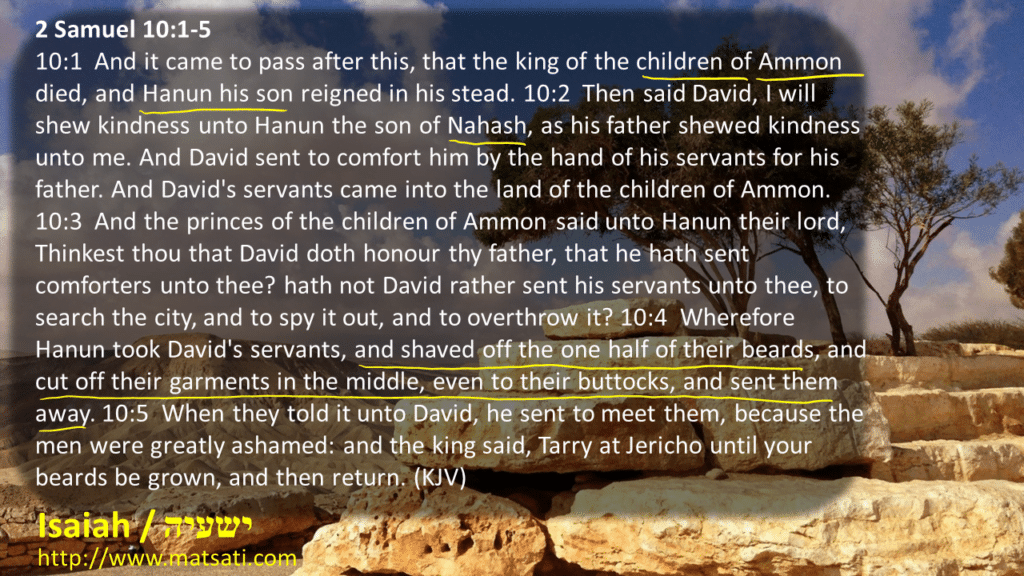
2 Samuel 10:1-5
10:1 And it came to pass after this, that the king of the children of Ammon died, and Hanun his son reigned in his stead. 10:2 Then said David, I will shew kindness unto Hanun the son of Nahash, as his father shewed kindness unto me. And David sent to comfort him by the hand of his servants for his father. And David’s servants came into the land of the children of Ammon. 10:3 And the princes of the children of Ammon said unto Hanun their lord, Thinkest thou that David doth honour thy father, that he hath sent comforters unto thee? hath not David rather sent his servants unto thee, to search the city, and to spy it out, and to overthrow it? 10:4 Wherefore Hanun took David’s servants, and shaved off the one half of their beards, and cut off their garments in the middle, even to their buttocks, and sent them away. 10:5 When they told it unto David, he sent to meet them, because the men were greatly ashamed: and the king said, Tarry at Jericho until your beards be grown, and then return. (KJV)
We note, based upon this context of the shame of the beard being shaved and being sent home half naked. This is the context in which we read Isaiah 7:20. The razor is a sign of shame when used without one’s permission. Here Isaiah says, בַּיּוֹם הַהוּא יְגַלַּח אֲדֹנָי בְּתַעַר הַשְּׂכִירָה “In the same day shall the Lord shave with a razor that is hired” describing Assyria as that razor and describing that which was meant to help will turn against his enemies will turn towards Ahaz and the people. Note that come commentators claim this reference to Ahaz is a gloss. The connection to the Neviim section of the Tanakh however makes this an important point that God is making to Ahaz, a story that he should be familiar with. (2 Samuel 10:1-5) Obviously according to the Tanakh the shaving of the face and head is a way for keeping captives. Note the woman that was taking prisoner according to the Torah, her head was to be shaved, if an Israelite wanted to marry the woman. (Devarim / Deuteronomy 21:10-14)
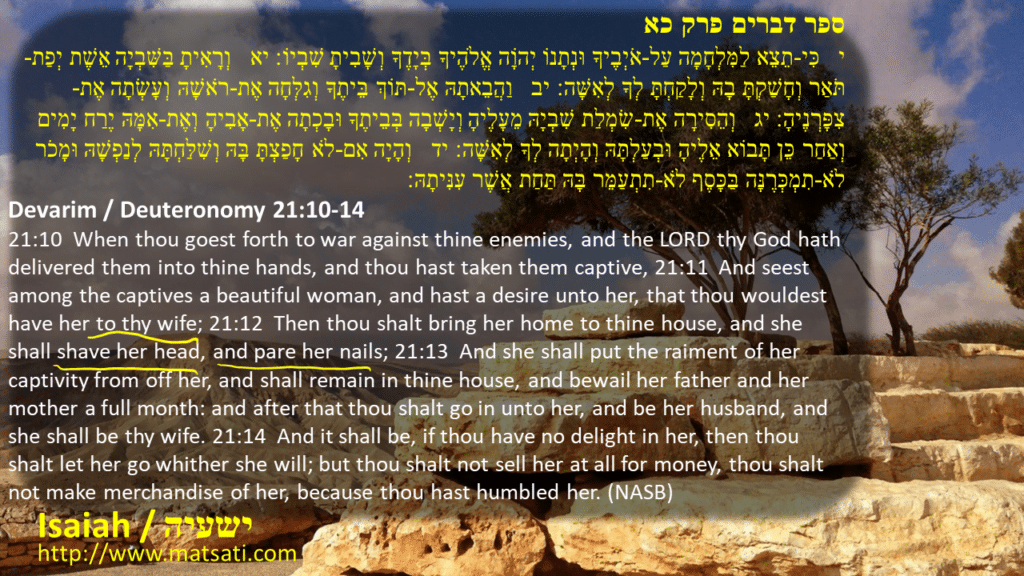
ספר דברים פרק כא
י כִּי-תֵצֵא לַמִּלְחָמָה עַל-אֹיְבֶיךָ וּנְתָנוֹ יְהוָֹה אֱלֹהֶיךָ בְּיָדֶךָ וְשָׁבִיתָ שִׁבְיוֹ: יא וְרָאִיתָ בַּשִּׁבְיָה אֵשֶׁת יְפַת-תֹּאַר וְחָשַׁקְתָּ בָהּ וְלָקַחְתָּ לְךָ לְאִשָּׁה: יב וַהֲבֵאתָהּ אֶל-תּוֹךְ בֵּיתֶךָ וְגִלְּחָה אֶת-רֹאשָׁהּ וְעָשְֹתָה אֶת-צִפָּרְנֶיהָ: יג וְהֵסִירָה אֶת-שִֹמְלַת שִׁבְיָהּ מֵעָלֶיהָ וְיָשְׁבָה בְּבֵיתֶךָ וּבָכְתָה אֶת-אָבִיהָ וְאֶת-אִמָּהּ יֶרַח יָמִים וְאַחַר כֵּן תָּבוֹא אֵלֶיהָ וּבְעַלְתָּהּ וְהָיְתָה לְךָ לְאִשָּׁה: יד וְהָיָה אִם-לֹא חָפַצְתָּ בָּהּ וְשִׁלַּחְתָּהּ לְנַפְשָׁהּ וּמָכֹר לֹא-תִמְכְּרֶנָּה בַּכָּסֶף לֹא-תִתְעַמֵּר בָּהּ תַּחַת אֲשֶׁר עִנִּיתָהּ:
Devarim / Deuteronomy 21:10-14
21:10 When thou goest forth to war against thine enemies, and the LORD thy God hath delivered them into thine hands, and thou hast taken them captive, 21:11 And seest among the captives a beautiful woman, and hast a desire unto her, that thou wouldest have her to thy wife; 21:12 Then thou shalt bring her home to thine house, and she shall shave her head, and pare her nails; 21:13 And she shall put the raiment of her captivity from off her, and shall remain in thine house, and bewail her father and her mother a full month: and after that thou shalt go in unto her, and be her husband, and she shall be thy wife. 21:14 And it shall be, if thou have no delight in her, then thou shalt let her go whither she will; but thou shalt not sell her at all for money, thou shalt not make merchandise of her, because thou hast humbled her. (NASB)
Again all of these concepts may be drawn into the Isaiah text on Isaiah 7:20. Figuratively speaking, these things describe complete humiliation where all the hair on the body is shorn off, even to that badge of respect, the beard thus the humility that is ascribed to Judah, the people and Ahaz will have no honor left.
ספר ישעיה פרק ז
כא וְהָיָה בַּיּוֹם הַהוּא יְחַיֶּה-אִישׁ עֶגְלַת בָּקָר וּשְׁתֵּי-צֹאן: כב וְהָיָה מֵרֹב עֲשֹוֹת חָלָב יֹאכַל חֶמְאָה כִּי-חֶמְאָה וּדְבַשׁ יֹאכֵל כָּל-הַנּוֹתָר בְּקֶרֶב הָאָרֶץ:
Isaiah 7:21 states, “And it shall come to pass in that day, (וְהָיָה בַּיּוֹם הַהוּא) that a man shall nourish a young cow, and two sheep; (יְחַיֶּה-אִישׁ עֶגְלַת בָּקָר וּשְׁתֵּי-צֹאן)” Isaiah 7:22 “And it shall come to pass, for the abundance of milk (וְהָיָה מֵרֹב עֲשֹוֹת חָלָב) that they shall give he shall eat butter: for butter and honey (יֹאכַל חֶמְאָה כִּי-חֶמְאָה וּדְבַשׁ) shall everyone eat that is left in the land. (יֹאכֵל כָּל-הַנּוֹתָר בְּקֶרֶב הָאָרֶץ)” This idea of what is expressed in this phrase, יְחַיֶּה-אִישׁ עֶגְלַת בָּקָר וּשְׁתֵּי-צֹאן “that a man shall nourish a young cow, and two sheep” speaks to the idea that at one time a man had herds of cows and sheep to now only having one and two, respectively. This does symbolize the decrease in wealth, but yet being blessed to have milk enough to make butter and be sustained from the fat of the butter. We note in the statement, יְחַיֶּה-אִישׁ עֶגְלַת בָּקָר וּשְׁתֵּי-צֹאן that the the word for nourish יְחַיֶּה is the Piel, yiqattel (imperfect), third person, masculine, singular form of the word חיה meaning life. From the Piel imperfect paradigm, the yiqattel means “he will make live” or “sustain” and here in the KJV is translated as nourish. In this situation, the roles are reversed, as the man works diligently to nourish the beasts, whereas the cow and sheep will produce a smaller amount of benefit relative to the effort going into keeping the animals alive. This is the kind of disaster that comes upon a people and a king who trust in man as opposed to trusting in God. Nevertheless, the God of Israel remains faithful to the remnant of people who survive the coming storm.
ספר ישעיה פרק ז
כג וְהָיָה בַּיּוֹם הַהוּא יִהְיֶה כָל-מָקוֹם אֲשֶׁר יִהְיֶה-שָּׁם אֶלֶף גֶּפֶן בְּאֶלֶף כָּסֶף לַשָּׁמִיר וְלַשַּׁיִת יִהְיֶה: כד בַּחִצִּים וּבַקֶּשֶׁת יָבוֹא שָׁמָּה כִּי-שָׁמִיר וָשַׁיִת תִּהְיֶה כָל-הָאָרֶץ: כה וְכֹל הֶהָרִים אֲשֶׁר בַּמַּעְדֵּר יֵעָדֵרוּן לֹא-תָבוֹא שָׁמָּה יִרְאַת שָׁמִיר וָשָׁיִת וְהָיָה לְמִשְׁלַח שׁוֹר וּלְמִרְמַס שֶֹה:
Isaiah 7:23 states, “And it shall come to pass in that day, (וְהָיָה בַּיּוֹם הַהוּא) that every place shall be, (יִהְיֶה כָל-מָקוֹם) where there were a thousand vines at a thousand silverlings, (אֲשֶׁר יִהְיֶה-שָּׁם אֶלֶף גֶּפֶן בְּאֶלֶף כָּסֶף) it shall even be for briers and thorns. (לַשָּׁמִיר וְלַשַּׁיִת יִהְיֶה)” Isaiah 7:24 “With arrows and with bows shall men come thither; (בַּחִצִּים וּבַקֶּשֶׁת יָבוֹא שָׁמָּה) because all the land shall become briers and thorns. (כִּי-שָׁמִיר וָשַׁיִת תִּהְיֶה כָל-הָאָרֶץ)” Isaiah 7:25 “And on all hills that shall be digged with the mattock, (וְכֹל הֶהָרִים אֲשֶׁר בַּמַּעְדֵּר יֵעָדֵרוּן) there shall not come thither the fear of briers and thorns: (לֹא-תָבוֹא שָׁמָּה יִרְאַת שָׁמִיר וָשָׁיִת) but it shall be for the sending forth of oxen, and for the treading of lesser cattle. (וְהָיָה לְמִשְׁלַח שׁוֹר וּלְמִרְמַס שֶֹה)” The places which produced large amounts of fruit, indicated by the אֲשֶׁר יִהְיֶה-שָּׁם אֶלֶף גֶּפֶן בְּאֶלֶף כָּסֶף “where there were a thousand vines at a thousand silver” is turned to briars and thorns (לַשָּׁמִיר וְלַשַּׁיִת). This describes the situation of men no longer working the land, pulling the briars and thistles, an indication of no longer tending to the gardens. This is due to the depopulation of the land through war, the exportation of the people to babylon. The bow and arrows (Isaiah 7:24) suggest these places will become the place for deer to hide. John Oswalt suggests this may be an allusion to the song of the vineyard found in Isaiah 5:1-7. This turns into destruction and the vineyards and hillsides become covered in briars and thorns and the trampling places for animals.
Rabbinic Commentary on Isaiah 7:14-25
The Targum Jonathan is a rabbinic translation of the book of Isaiah, Jonathan translates Isaiah in the following way:
תרגום יונתן בן עוזיאל אל ישעיה פרק ז:יד-כה
יד בְכֵין יִתֵין יוי הוּא לְכֹון אָתָא הָא עוּלֵימְתָא מְעַדְיָא וּתלִיד בַר וְתִקרֵי שְמֵיה עִמָנוּ אֵל׃ טו שְמַן וּדבַש יֵיכֹול עַד לָא יִדַע † לְרַחָקָא בִישָא וּלקָרָבָא טָבָא׃ טז אְרֵי עַד לָא יִדַע עוּלֵימָא לְרַחָקָא בִישָא וּלקָרָבָא טָבָא תִתרְטֵיש אַרעָא דְאַת מְעִיק מִן קֳדָם תְרֵין מַלכַהָא׃ יז יַיתֵי יוי עְלָך וְעַל עַמָך וְעַל בֵית אְבוּך יֹומִין דְלָא אְתֹו לְמִיֹומָא דְאִתפְלִיגוּ בֵית יִשׂרָאֵל עַל דְבֵית יְהוּדָה יָת מַלכָא דְאַתוּר׃ יח וִיהֵי בְעִידָנָא הַהוּא יַכלֵי יוי לְעַם קִטרֵי מַשרְיָת גִיבָרַיָא דְסַגִיאִין כְדִיבְבַיָא וְיַיתֵינוּן מֵאַרעָא דְמִצרַיִם וְלַעְזִיזֵי מַשרְיָתָא דְאִינוּן תַקִיפִין כְדַברַאיָתָא וְיַיתֵינוּן מִסְיָפֵי אַרעָא דְאַתוּר׃ יט וְיֵיתֹון וְיִשרֹון כוּלְהֹון בִרחֹובֵי קִריָא וּבִשקִיפֵי כֵיפַיָא וּבכָל מַדבְרֵי נַעְצוּצַיָא וּבכֹל בָתֵי תוּשבְחָתָא׃ כ בְעִידָנָא הַהוּא יִקטֹול יוי בְהֹון כְמָא דְמִתקְטִיל בַחְרַב חָרִיפָא בְסִבכַיָא בִמגִירַיָא בְעַברֵי נַהרָא בְמַלכָא דְאַתוּר יָת מַלכָא וְעַם מַשרְיָתֵיה וְאַף יָת שִלטֹונַיָא כַחדָא יְשֵיצֵי׃. כא וִיהֵי בְעִידָנָא הַהוּא יְקַיֵים גְבַר עַגלַת תֹורִין וְתַרתֵין עָן׃ כב וִיהֵי מִסְגֵי טוּב † יֵיכֹול שְמַן אְרֵי שְמַן וּדבַש יִתפַרנְסוּן כָל צַדִיקַיָא דְיִשתַאְרוּן בְגַוַה דְאַרעָא׃ כג וִיהֵי בְעִידָנָא הַהוּא יְהֵי כָל אְתַר דְיִהוְייָן תַמָן אַלַף גוּפנִין שַוִין אַלַף מְנָן דִכסַף לְהוּבאֵי וּבוּר יְהֵי׃ כד בְגִירָן וּבקַשתָן יְהָכוּן לְתַמָן אְרֵי הוּבאֵי וּבוּר תְהֵי כָל אַרעָא׃ כה וְכָל טוּרַיָא דְבֵית יְהוּדָה דִבמַעדַר יִתפַלחוּן לָא תֵיעֹול לְתַמָן דַחלַת הוּבאֵי וּבוּר וִיהֵי לְבֵית אַרבְעָה בַקרָן דְתֹורִין וּלבֵית מִשרֵי עַדרִין דְעָן׃
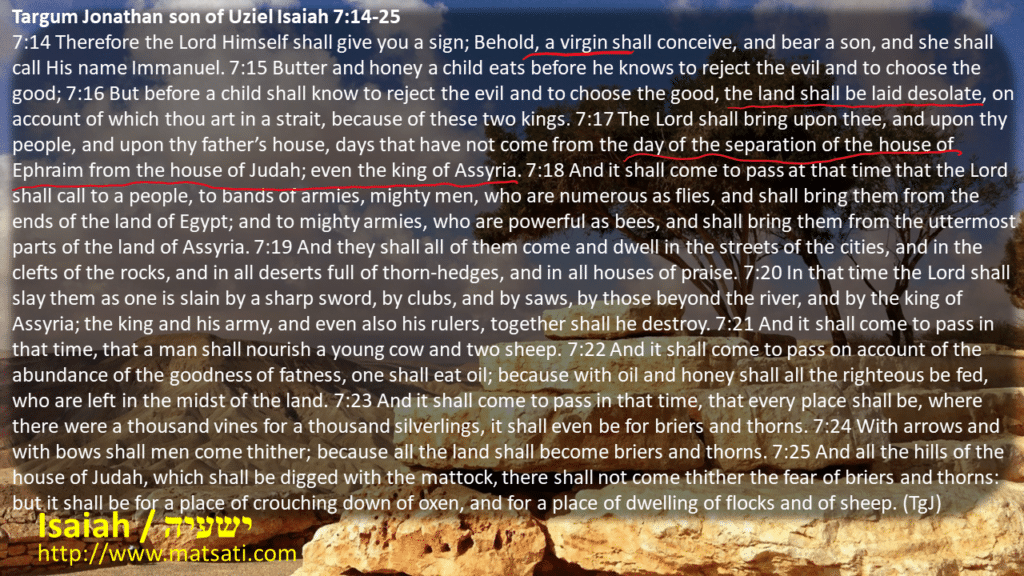
Targum Jonathan son of Uziel Isaiah 7:14-25
7:14 Therefore the Lord Himself shall give you a sign; Behold, a virgin shall conceive, and bear a son, and she shall call His name Immanuel. 7:15 Butter and honey a child eats before he knows to reject the evil and to choose the good; 7:16 But before a child shall know to reject the evil and to choose the good, the land shall be laid desolate, on account of which thou art in a strait, because of these two kings. 7:17 The Lord shall bring upon thee, and upon thy people, and upon thy father’s house, days that have not come from the day of the separation of the house of Ephraim from the house of Judah; even the king of Assyria. 7:18 And it shall come to pass at that time that the Lord shall call to a people, to bands of armies, mighty men, who are numerous as flies, and shall bring them from the ends of the land of Egypt; and to mighty armies, who are powerful as bees, and shall bring them from the uttermost parts of the land of Assyria. 7:19 And they shall all of them come and dwell in the streets of the cities, and in the clefts of the rocks, and in all deserts full of thorn-hedges, and in all houses of praise. 7:20 In that time the Lord shall slay them as one is slain by a sharp sword, by clubs, and by saws, by those beyond the river, and by the king of Assyria; the king and his army, and even also his rulers, together shall he destroy. 7:21 And it shall come to pass in that time, that a man shall nourish a young cow and two sheep. 7:22 And it shall come to pass on account of the abundance of the goodness of fatness, one shall eat oil; because with oil and honey shall all the righteous be fed, who are left in the midst of the land. 7:23 And it shall come to pass in that time, that every place shall be, where there were a thousand vines for a thousand silverlings, it shall even be for briers and thorns. 7:24 With arrows and with bows shall men come thither; because all the land shall become briers and thorns. 7:25 And all the hills of the house of Judah, which shall be digged with the mattock, there shall not come thither the fear of briers and thorns: but it shall be for a place of crouching down of oxen, and for a place of dwelling of flocks and of sheep. (TgJ)
The TgJ relates Isaiah’s words on Isaiah 7:18-19 as the ungodly men who come, as numerous as flies from the ends of the earth, to dwell in the streets, cities, clefts, and even the houses of praise. This statement brings to mind the idea of how this world is affecting the minds of God’s people, especially the media and modern television programming. In parallel to the Apostolic Writings, Jude gives us a dire warning according to Judge 1:1-4.
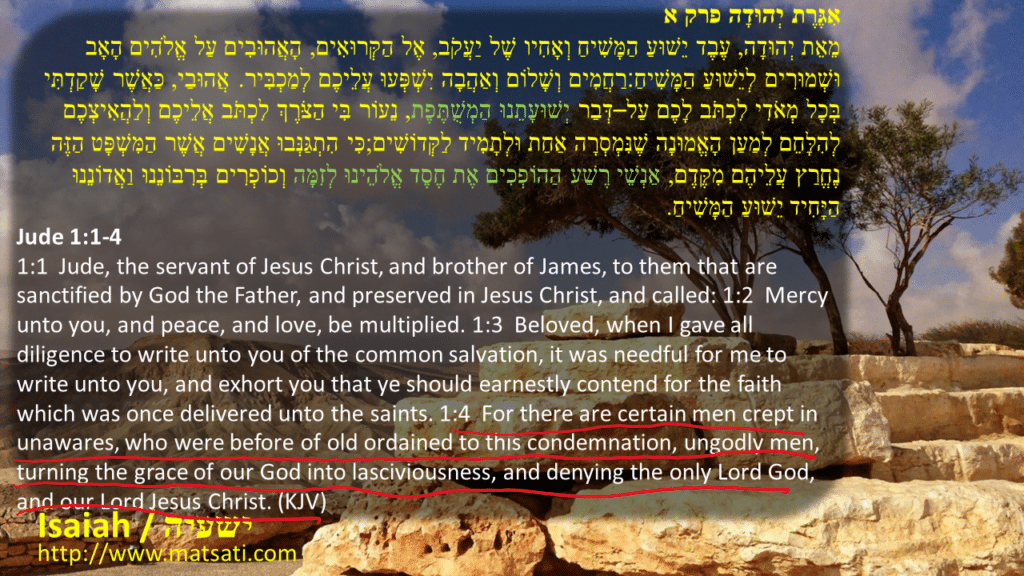
אִגֶּרֶת יְהוּדָה פרק א
מֵאֵת יְהוּדָה, עֶבֶד יֵשׁוּעַ הַמָּשִׁיחַ וְאָחִיו שֶׁל יַעֲקֹב, אֶל הַקְּרוּאִים, הָאֲהוּבִים עַל אֱלֹהִים הָאָב וּשְׁמוּרִים לְיֵשׁוּעַ הַמָּשִׁיחַ׃רַחֲמִים וְשָׁלוֹם וְאַהֲבָה יִשְׁפְּעוּ עֲלֵיכֶם לְמַכְבִּיר. אֲהוּבַי, כַּאֲשֶׁר שָׁקַדְתִּי בְּכָל מְאֹדִי לִכְתֹּב לָכֶם עַל–דְּבַר יְשׁוּעָתֵנוּ הַמְשֻׁתֶּפֶת, נֵעוֹר בִּי הַצֹּרֶךְ לִכְתֹּב אֲלֵיכֶם וְלַהֲאִיצְכֶם לְהִלָּחֵם לְמַעַן הָאֱמוּנָה שֶׁנִּמְסְרָה אַחַת וּלְתָמִיד לַקְּדוֹשִׁים;כִּי הִתְגַּנְּבוּ אֲנָשִׁים אֲשֶׁר הַמִּשְׁפָּט הַזֶּה נֶחֱרַץ עֲלֵיהֶם מִקֶּדֶם, אַנְשֵׁי רֶשַׁע הַהוֹפְכִים אֶת חֶסֶד אֱלֹהֵינוּ לְזִמָּה וְכוֹפְרִים בְּרִבּוֹנֵנוּ וַאֲדוֹנֵנוּ הַיָּחִיד יֵשׁוּעַ הַמָּשִׁיחַ.
Jude 1:1-4
1:1 Jude, the servant of Jesus Christ, and brother of James, to them that are sanctified by God the Father, and preserved in Jesus Christ, and called: 1:2 Mercy unto you, and peace, and love, be multiplied. 1:3 Beloved, when I gave all diligence to write unto you of the common salvation, it was needful for me to write unto you, and exhort you that ye should earnestly contend for the faith which was once delivered unto the saints. 1:4 For there are certain men crept in unawares, who were before of old ordained to this condemnation, ungodly men, turning the grace of our God into lasciviousness, and denying the only Lord God, and our Lord Jesus Christ. (KJV)
Jude speaks of something very similar to what we see taking place in Isaiah, except that the men who enter into God’s house are deceiving God’s people. The idea is that these men turn the grace of God into lasciviousness and deny Yeshua as being the Messiah and consequently deny the Lord God Almighty too. There is this twisting of truth, the eroding of values, which lead to lasciviousness in the holy places, in the hearts of men, women, and children. The word lasciviousness means “lacking in moral discipline, having no regard for accepted moral standards.” This is a vexing of the soul, something similar to what we read happened to Lot when he decided to move to Sodom and live in the city. (2 Peter 2:7-10) Lot chose the prosperous plains of the Jordan River valley. Eventually Lot moved to wicked Sodom where he would have riches and luxury (Bereshit / Genesis 13:10-13). By settling in Sodom, Lot lost his power to influence family members, and also he lost his possessions and his wife (Bereshit / Genesis 19:1-15) The word lasciviousness is derived from the Latin “lascivia,” meaning loose, runaway passion and lust. It signifies licentiousness, lawlessness, and the casting off of all restraints. It also represents all that’s filthy, degrading, lewd and obscene. Yeshua called lasciviousness a sin that comes from within, “that which cometh out of the man, that defileth the man. For from within, out of the heart of men, proceed evil thoughts, adulteries, fornications, murders, thefts, covetousness, wickedness, deceit, lasciviousness.” (Mark 7:20-22, note Yeshua was teaching about נטילת ידיים (netilat yadayim) and not teaching against kashrut in Mark 7) Jude speaks of these godless men entering into the houses of praise for the purpose of perverting the truth. We note something that Jeremiah said according to Jeremiah 23:32, הִ֠נְנִי עַֽל־נִבְּאֵ֞י חֲלֹמ֥וֹת שֶׁ֙קֶר֙ נְאֻם־יְהוָ֔ה וַֽיְסַפְּרוּם֙ וַיַּתְע֣וּ אֶת־עַמִּ֔י בְּשִׁקְרֵיהֶ֖ם וּבְפַחֲזוּתָ֑ם וְאָנֹכִ֨י לֹֽא־שְׁלַחְתִּ֜ים וְלֹ֣א צִוִּיתִ֗ים וְהוֹעֵ֛יל לֹֽא־יוֹעִ֥ילוּ לָֽעָם־הַזֶּ֖ה נְאֻם־יְהוָֽה׃ “Behold, I am against them that prophesy false dreams, saith the LORD, and do tell them, and cause my people to err by their lies, and by their lightness; yet I sent them not, nor commanded them: therefore they shall not profit this people at all, saith the LORD.” (KJV) Note the word וּבְפַחֲזוּתָ֑ם translated “lightness” in the KJV comes from the root פַּחֲזוּת meaning “boasting” and is a noun, common, feminine, singular, construct form which is translated as “lightness” of making light of their falsehood and lies. Jeremiah says that these types of people make light of untruth and ridicule soberness that comes with the true worship of the Lord God in heaven. The aim of the evil one is to bring this spirit of lightness or boasting (disregard) into the lives of God’s people. Here in Isaiah literally all of the people were killed, driven out, or exported in exile, and the ungodly occupied these places of worship. The modern application looks to those who believe the Lord is no longer serious about sin. The evil one wants everyone to believe there is no wrath to come, and that God’s grace covers unrepentant sin. Note how the evil one whispers don’t worry about your lusts, God is abundant in mercy and forgiveness. Paul writes saying these ungodly people “hold the truth in unrighteousness” (Romans 1:18). Yet, in spite of being blessed by God’s truth, they turned from God’s truth to believe a lie. They refused to forsake their lascivious ways, and instead gave themselves over to their lusts and gave themselves over to their sins. This is the result of the influence of this world on the hearts and minds of God’s people. This is the idea behind Isaiah’s cry, “Truth is fallen in the street…Yea, truth faileth” (Isaiah 59:14-15). Similarly, Ahaz knew the promises of God but refused to trust in the Lord, and instead trusted in man (Assyria). The motivation was due to his lack of faith, even such that when given the opportunity for a sign from God he refused. So Isaiah gives Ahaz a sign saying the following according to Isaiah 7:14.
Isaiah 7:14 states, יד בְכֵין יִתֵין יוי הוּא לְכֹון אָתָא הָא עוּלֵימְתָא מְעַדְיָא וּתלִיד בַר וְתִקרֵי שְמֵיה עִמָנוּ אֵל׃ 7:14 Therefore the Lord Himself shall give you a sign; Behold, a virgin shall conceive, and bear a son, and she shall call His name Immanuel. (TgJ) Jonathan here basically transliterates Isaiah 7:14 into Aramaic. Rabbeinu Bahya interprets this verse in the following way.
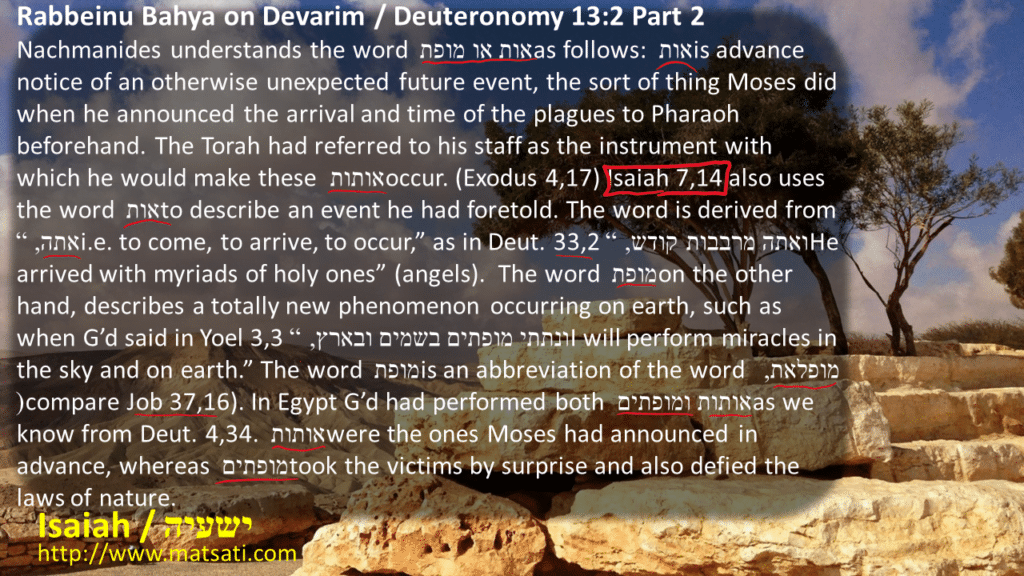
Rabbeinu Bahya on Devarim / Deuteronomy 13:2 Part 2
Nachmanides understands the word אות או מופת as follows: אות is advance notice of an otherwise unexpected future event, the sort of thing Moses did when he announced the arrival and time of the plagues to Pharaoh beforehand. The Torah had referred to his staff as the instrument with which he would make these אותות occur. (Exodus 4,17) Isaiah 7,14 also uses the word אות to describe an event he had foretold. The word is derived from אתה, “i.e. to come, to arrive, to occur,” as in Deut. 33,2 ואתה מרבבות קודש, “He arrived with myriads of holy ones” (angels). The word מופת on the other hand, describes a totally new phenomenon occurring on earth, such as when G’d said in Yoel 3,3 ונתתי מופתים בשמים ובארץ, “I will perform miracles in the sky and on earth.” The word מופת is an abbreviation of the word מופלאת, (compare Job 37,16). In Egypt G’d had performed both אותות ומופתים as we know from Deut. 4,34. אותות were the ones Moses had announced in advance, whereas מופתים took the victims by surprise and also defied the laws of nature.
Here Rabbeinu Bahya draws in the Torah from Devarim / Deuteronomy 13:2 and focuses upon the word מוֹפֵֽת which means “wonder, sign” speaking of when a prophet arises among you or a dreamer of dreams gives you a sign or wonder (כִּֽי־יָק֤וּם בְּקִרְבְּךָ֙ נָבִ֔יא א֖וֹ חֹלֵ֣ם חֲל֑וֹם וְנָתַ֥ן אֵלֶ֛יךָ א֖וֹת א֥וֹ מוֹפֵֽת) a warning is given according to Devarim / Deuteronomy 13:3-4.
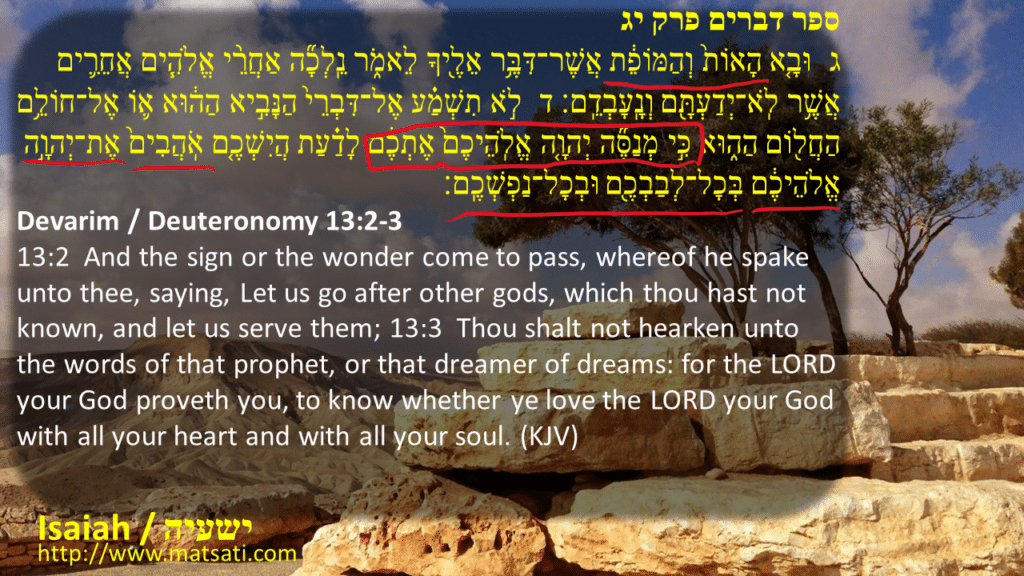
ספר דברים פרק יג
ג וּבָ֤א הָאוֹת֙ וְהַמּוֹפֵ֔ת אֲשֶׁר־דִּבֶּ֥ר אֵלֶ֖יךָ לֵאמֹ֑ר נֵֽלְכָ֞ה אַחֲרֵ֨י אֱלֹהִ֧ים אֲחֵרִ֛ים אֲשֶׁ֥ר לֹֽא־יְדַעְתָּ֖ם וְנָֽעָבְדֵֽם׃ ד לֹ֣א תִשְׁמַ֗ע אֶל־דִּבְרֵי֙ הַנָּבִ֣יא הַה֔וּא א֛וֹ אֶל־חוֹלֵ֥ם הַחֲל֖וֹם הַה֑וּא כִּ֣י מְנַסֶּ֞ה יְהוָ֤ה אֱלֹֽהֵיכֶם֙ אֶתְכֶ֔ם לָדַ֗עַת הֲיִשְׁכֶ֤ם אֹֽהֲבִים֙ אֶת־יְהוָ֣ה אֱלֹהֵיכֶ֔ם בְּכָל־לְבַבְכֶ֖ם וּבְכָל־נַפְשְׁכֶֽם׃
Devarim / Deuteronomy 13:2-3
13:2 And the sign or the wonder come to pass, whereof he spake unto thee, saying, Let us go after other gods, which thou hast not known, and let us serve them; 13:3 Thou shalt not hearken unto the words of that prophet, or that dreamer of dreams: for the LORD your God proveth you, to know whether ye love the LORD your God with all your heart and with all your soul. (KJV)
We note a statistic on witchcraft in the USA as the fastest growing religion in the USA. There are numerous television shows which portray witchcraft as good, and as producing many miraculous signs and wonders. The increase in television programming producing more and more of these shows is directly correlated to the increase in interest and pursuit of this religion indicated by the statistics. This demonstrates how much of an influence the world has upon people in general in rebellion against God. (see 1 Samuel 15:23) When people lay down their bibles and substitute reading God’s word for these kinds of things (television), the natural outcome is to turn from God’s ways. This is what happened to Judah and Jerusalem in Isaiah’s time.
Isaiah continues saying according to Isaiah 7;15, טו שְמַן וּדבַש יֵיכֹול עַד לָא יִדַע † לְרַחָקָא בִישָא וּלקָרָבָא טָבָא׃ 7:15 Butter and honey a child eats before he knows to reject the evil and to choose the good; (TgJ) The idea being drawn out here is on the innocence of the child. This draws in the concepts from the Tanakh as for example from 2 Chronicles 7:14 we read 7:14 and My people who are called by My name would humble themselves and pray and seek My face and turn from their wicked ways, then I will hear from heaven, will forgive their sin and will heal their land. (NASB) The Torah command on purity is related to being humble and submitting to God’s word. When we come before the Lord in prayer, seeking His mercy, and His Holy Ways, we are also to do so with a humble heart. Akeidat Yitzchak states the following concerning this verse.
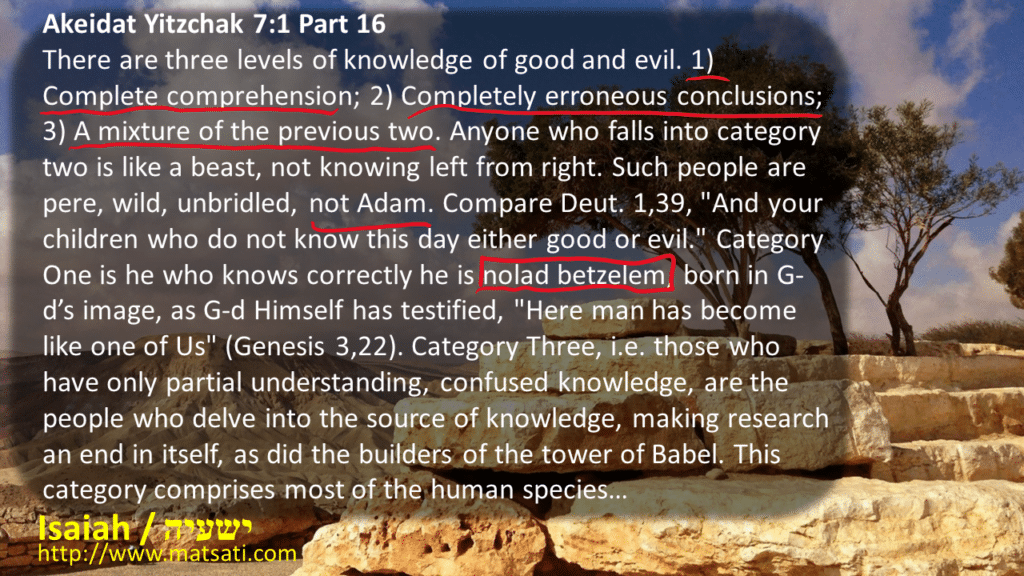
Akeidat Yitzchak 7:1 Part 16
There are three levels of knowledge of good and evil. 1) Complete comprehension; 2) Completely erroneous conclusions; 3) A mixture of the previous two. Anyone who falls into category two is like a beast, not knowing left from right. Such people are pere, wild, unbridled, not Adam. Compare Deut. 1,39, “And your children who do not know this day either good or evil.” Category One is he who knows correctly he is nolad betzelem, born in G-d’s image, as G-d Himself has testified, “Here man has become like one of Us” (Genesis 3,22). Category Three, i.e. those who have only partial understanding, confused knowledge, are the people who delve into the source of knowledge, making research an end in itself, as did the builders of the tower of Babel. This category comprises most of the human species. The tree of knowledge, though adjacent to the tree of life, was also close to all the other trees. The observer of the scene in the garden of Eden had three choices then. He could ignore the tree completely, and be termed sub-human. Or, he could notice it and all its attractive features, gain valuable insights through smelling it, touching it, and maybe even tasting it, though not eating its fruit. The result would be G-d like appreciation of good and evil. However, the exclusive preoccupation with it called “eating,” consuming it while being consumed by its charm, was forbidden and would result in mortality, abandoning oneself to the material, physical. We find in halachah, Jewish law, that whenever “eating” is forbidden, tasting may be permissible, since the principle is that tasting is not something of substance (Berachot 14). The deep involvement in eating from that tree produces as a corollary the result that such a person is no longer receptive to the purely spiritual/ intellectual such as represented by the tree of life. Thus one loses one’s anchor in the “higher” world (called by our sages chut shel chessed). What happened to Adam when he abused the tree of knowledge is similar to what happened to King Saul after his failure to kill Agag king of Amalek, when hashgacha pratit, G-d’s Personal Providence, was withdrawn, and His kingdom was no longer considered G-d’s kingdom. When Isaac had said to Esau, “Whenever he (Jacob) will reject the yoke of the Torah, you (Esau) will break the bond” (Genesis 27,40), he also referred to the fact that G-d would then withdraw His hashgachah peratit from the people of Israel. Israel’s descent to Egypt, a result of what the brothers had done to Joseph, or the survivors of the generation of spies in the desert, are all examples of the results of failures similar to what had occurred in the garden of Eden. “Mot-Tamut,” you will surely die. The tragedy, according to Bereshit Rabbah 16, was that the mortality incurred by Adam was automatically conferred upon his entire offspring, i.e. upon the entire human species. This is the reason the word mot tamut is repeated. All the other trees, the tree of life excepted, contained life’s necessities, therefore eating from those trees was permitted.
Akedat Yitzchak speaks of three types of people, one who seeks The Lord and His ways in order to understand truth, good, and life and to stay away from evil, and to learn how to live life based upon the Word of God. Second is the one who behaves like an animal in regard to havdalah between good and evil. And third, the kind of person who likes the idea of simply studying these things, but its practical application is elusive to such a person.
Havdalah is Hebrew for “separation” and refers to the verbal declaration made at the end of Shabbat or a Jewish holiday, in which the holy day is separated from the mundane period that follows. This describes the ability to distinguish, discern, judge, or appraise a person, statement, situation, or environment.
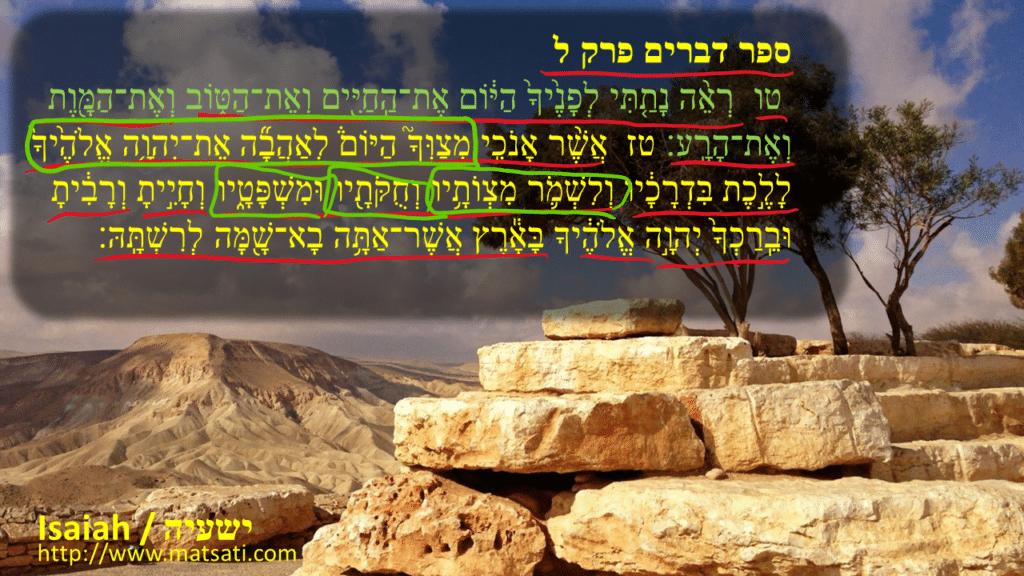
ספר דברים פרק ל
טו רְאֵ֨ה נָתַ֤תִּי לְפָנֶ֙יךָ֙ הַיּ֔וֹם אֶת־הַֽחַיִּ֖ים וְאֶת־הַטּ֑וֹב וְאֶת־הַמָּ֖וֶת וְאֶת־הָרָֽע׃ טז אֲשֶׁ֨ר אָנֹכִ֣י מְצַוְּךָ֮ הַיּוֹם֒ לְאַהֲבָ֞ה אֶת־יְהוָ֤ה אֱלֹהֶ֙יךָ֙ לָלֶ֣כֶת בִּדְרָכָ֔יו וְלִשְׁמֹ֛ר מִצְוֺתָ֥יו וְחֻקֹּתָ֖יו וּמִשְׁפָּטָ֑יו וְחָיִ֣יתָ וְרָבִ֔יתָ וּבֵֽרַכְךָ֙ יְהוָ֣ה אֱלֹהֶ֔יךָ בָּאָ֕רֶץ אֲשֶׁר־אַתָּ֥ה בָא־שָׁ֖מָּה לְרִשְׁתָּֽהּ׃
Note how the Lord God Almighty blesses those who are discerning between good and evil, by living our lives for Him. Those who do listen are described as נולד בְּצֶ֣לֶם “born in the image” of God. This follows what Yeshua taught according to Matthew 7:17-20, 7:16 Ye shall know them by their fruits. Do men gather grapes of thorns, or figs of thistles? 7:17 Even so every good tree bringeth forth good fruit; but a corrupt tree bringeth forth evil fruit. 7:18 A good tree cannot bring forth evil fruit, neither can a corrupt tree bring forth good fruit. 7:19 Every tree that bringeth not forth good fruit is hewn down, and cast into the fire. 7:20 Wherefore by their fruits ye shall know them. (KJV) We note the Torah based principles here, that a tree that causes death is no good, it cannot bear good fruit in spite of anything it does outside of God changing the tree itself to produce good fruit. We also note that Akedat Yitzchak at the end of his commentary on Isaiah 7:15 speaks about Jacob and Esau, with Esau rejecting the covenant of God (turning from Torah) and how doing such a thing, the Lord will remove His Divine Presence (hashgacha pratit) from the people of Israel. Examples of this are taken from the idea of living in unrepentant sin with Joseph and his brothers, because of their brothers living in their sin against Joseph, they descended into Egypt as the Divine Presence was removed. Another example is taken from the Garden of Eden. Midrash Rabbah on Bereshit, Parashat 16 states that this mortality that resulted from Adam and Eve’s sin was passed down to their offspring and the entire human race. This is not a proof text for the children inheriting Adam’s sin, but that of bearing the consequences of the sin of the father. Being faced with the outcome of sin leading to the curse and death. This illustrates how sin can be multigenerational, having an effect of even destroying an entire generation of people through one man. This is also the major concept of how likewise through one man, generations of men may also be saved! Notice how these things are centered around the tree of the knowledge of good and evil and the tree of life. This Torah-based narrative is essential for understanding how Salvation in the Messiah Yeshua works!
Isaiah 7:16 states, טז אְרֵי עַד לָא יִדַע עוּלֵימָא לְרַחָקָא בִישָא וּלקָרָבָא טָבָא תִתרְטֵיש אַרעָא דְאַת מְעִיק מִן קֳדָם תְרֵין מַלכַהָא׃ 7:16 But before a child shall know to reject the evil and to choose the good, the land shall be laid desolate, on account of which thou art in a strait, because of these two kings. (TgJ) This verse speaks to the extraordinary way in which man and woman were created as mankind due to this unique creation, and God breathing his neshama into man, enables one to make the decisions in life to choose either good or evil. Akeidat Yitzchak states the following in his commentary concerning this verse.
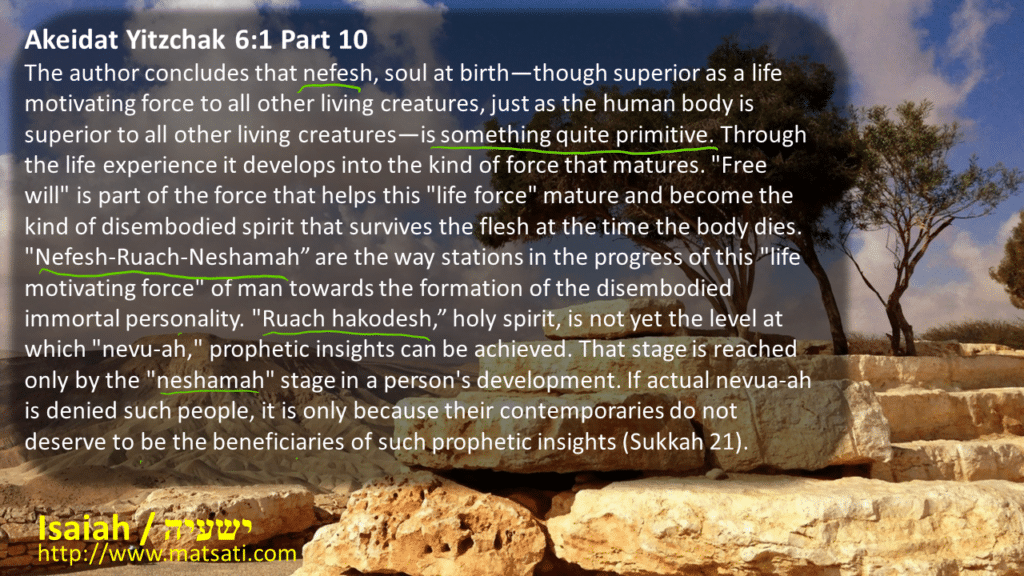
Akeidat Yitzchak 6:1 Part 10
The author concludes that nefesh, soul at birth—though superior as a life motivating force to all other living creatures, just as the human body is superior to all other living creatures—is something quite primitive. Through the life experience it develops into the kind of force that matures. “Free will” is part of the force that helps this “life force” mature and become the kind of disembodied spirit that survives the flesh at the time the body dies. “Nefesh-Ruach-Neshamah” are the way stations in the progress of this “life motivating force” of man towards the formation of the disembodied immortal personality. “Ruach hakodesh,” holy spirit, is not yet the level at which “nevu-ah,” prophetic insights can be achieved. That stage is reached only by the “neshamah” stage in a person’s development. If actual nevua-ah is denied such people, it is only because their contemporaries do not deserve to be the beneficiaries of such prophetic insights (Sukkah 21).
Akeidat Yitzchak’s commentary is based upon Bereshit / Genesis 2:7
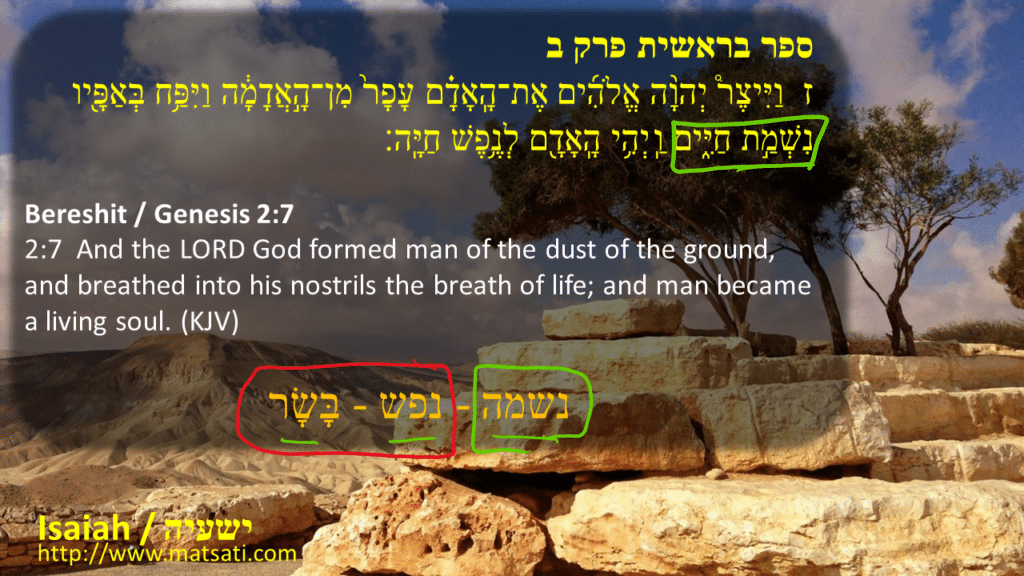
ספר בראשית פרק ב
ז וַיִּיצֶר֩ יְהוָ֨ה אֱלֹהִ֜ים אֶת־הָֽאָדָ֗ם עָפָר֙ מִן־הָ֣אֲדָמָ֔ה וַיִּפַּ֥ח בְּאַפָּ֖יו נִשְׁמַ֣ת חַיִּ֑ים וַֽיְהִ֥י הָֽאָדָ֖ם לְנֶ֥פֶשׁ חַיָּֽה׃
Bereshit / Genesis 2:7
2:7 And the LORD God formed man of the dust of the ground, and breathed into his nostrils the breath of life; and man became a living soul. (KJV)
Based upon this Scripture is developed all of these concepts, the uniqueness of man’s creation as the Lord did more than simply speak us into existence, he formed us, and then breathed into us. The נִשְׁמַ֣ת חַיִּ֑ים (Nishmat Chayim) is the aspect of our creation that provides us with “Free will” to choose between good and evil. Because we are given the ability to choose, we must live life in order to mature and understand the difference between good and evil. This is why discipline is so important in children’s lives, so that they can grow up to make this distinction. It is in this location in the Scriptures the Jewish concepts נשמה, נפש, בָּשָׂר (basar, nefesh, neshamah) referring to three levels of spirituality. The basar (flesh) is the base level, functioning in the flesh as nothing more than an animal. The nefesh is the point at which one is able to discern the good from the bad as we see in Isaiah 7:15, 7:15 and has the ability to listen and obey God’s Word (Devarim / Deuteronomy 30:15-16) such that one can choose between הַֽחַיִּ֖ים וְאֶת־הַטּ֑וֹב וְאֶת־הַמָּ֖וֶת וְאֶת־הָרָֽע “life and good” and “death and evil.” The neshamah is the highest spiritual level as hearing from God, this is the realm of prophetic utterance, and communion with God. We note that Akeidat Yitzchak states that this is a part of the development process as one grows and matures in life. We also note how these three words provide a balance of a sort with nefesh (נפש) at the center. The balance can be swayed either left to the flesh, or to the right, to the things of the spirit.
נשמה – נפש – בָּשָׂר
We also note that all of God’s creatures have the נפש – בָּשָׂר, but only man who is specially created has the neshamah (נשמה) which is something that is a gift from God and is also by invitation only. This is what it means to be human as opposed to the rest of creation as mere beasts. Read the book of Jude in the NT. Jude speaks of what it means to be a man living as a brute beast. The NT text also speaks to all men being invited to listen to the word of God, to believe, and to do. The idea that all men are invited is taught according to 1 Timothy 2:4 and 2 Peter 3:9.
Isaiah 7:17-18 states, יז יַיתֵי יוי עְלָך וְעַל עַמָך וְעַל בֵית אְבוּך יֹומִין דְלָא אְתֹו לְמִיֹומָא דְאִתפְלִיגוּ בֵית יִשׂרָאֵל עַל דְבֵית יְהוּדָה יָת מַלכָא דְאַתוּר׃ 7:17 The Lord shall bring upon thee, and upon thy people, and upon thy father’s house, days that have not come from the day of the separation of the house of Ephraim from the house of Judah; even the king of Assyria. יח וִיהֵי בְעִידָנָא הַהוּא יַכלֵי יוי לְעַם קִטרֵי מַשרְיָת גִיבָרַיָא דְסַגִיאִין כְדִיבְבַיָא וְיַיתֵינוּן מֵאַרעָא דְמִצרַיִם וְלַעְזִיזֵי מַשרְיָתָא דְאִינוּן תַקִיפִין כְדַברַאיָתָא וְיַיתֵינוּן מִסְיָפֵי אַרעָא דְאַתוּר׃ 7:18 And it shall come to pass at that time that the Lord shall call to a people, to bands of armies, mighty men, who are numerous as flies, and shall bring them from the ends of the land of Egypt; and to mighty armies, who are powerful as bees, and shall bring them from the uttermost parts of the land of Assyria. (TgJ) We remember the Torah narrative explaining how the Lord God Almighty will go before the people into the Promised Land and will drive out the indigenous peoples via the hornet, etc. This is the point of Shemot / Exodus 23:28 which speaks of God sending ahead of the people and driving out the Hivites, the Canaanites, and the Hittites. We note the spin on the Torah here in relation to Israel who has rejected God and His ways. Midrash Tanchuma Buber states the following using these verses from Isaiah.
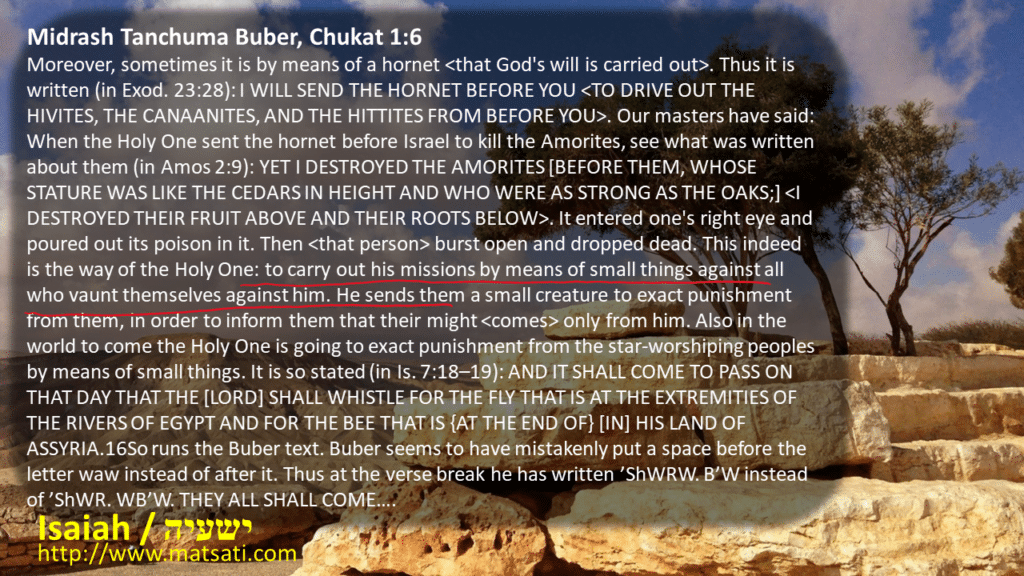
Midrash Tanchuma Buber, Chukat 1:6
Moreover, sometimes it is by means of a hornet . Thus it is written (in Exod. 23:28): I WILL SEND THE HORNET BEFORE YOU . Our masters have said: When the Holy One sent the hornet before Israel to kill the Amorites, see what was written about them (in Amos 2:9): YET I DESTROYED THE AMORITES [BEFORE THEM, WHOSE STATURE WAS LIKE THE CEDARS IN HEIGHT AND WHO WERE AS STRONG AS THE OAKS;] . It entered one’s right eye and poured out its poison in it. Then burst open and dropped dead. This indeed is the way of the Holy One: to carry out his missions by means of small things against all who vaunt themselves against him. He sends them a small creature to exact punishment from them, in order to inform them that their might only from him. Also in the world to come the Holy One is going to exact punishment from the star-worshiping peoples by means of small things. It is so stated (in Is. 7:18–19): AND IT SHALL COME TO PASS ON THAT DAY THAT THE [LORD] SHALL WHISTLE FOR THE FLY THAT IS AT THE EXTREMITIES OF THE RIVERS OF EGYPT AND FOR THE BEE THAT IS {AT THE END OF} [IN] HIS LAND OF ASSYRIA.16So runs the Buber text. Buber seems to have mistakenly put a space before the letter waw instead of after it. Thus at the verse break he has written ’ShWRW. B’W instead of ’ShWR. WB’W. THEY ALL SHALL COME….
What makes Isaiah 7:18 so interesting is in the way that the Hebrew text is written. יח וְהָיָה | בַּיּוֹם הַהוּא יִשְׁרֹק יְהֹוָה לַזְּבוּב אֲשֶׁר בִּקְצֵה יְאֹרֵי מִצְרָיִם וְלַדְּבוֹרָה אֲשֶׁר בְּאֶרֶץ אַשּׁוּר: 7:18, “And it shall come to pass in that day, (וְהָיָה | בַּיּוֹם הַהוּא) that the LORD shall hiss for the fly that is in the uttermost part of the rivers of Egypt, (יִשְׁרֹק יְהֹוָה לַזְּבוּב אֲשֶׁר בִּקְצֵה יְאֹרֵי מִצְרָיִם) and for the bee that is in the land of Assyria. (וְלַדְּבוֹרָה אֲשֶׁר בְּאֶרֶץ אַשּׁוּר)” Specifically with the word וְלַדְּבוֹרָה which is translated as “bees” we note that the root word for this is דבר “word.” This Hebrew word דבר carries with it such a depth of meaning, and here describes the bee in which the nations come forth to overwhelm Judah and Jerusalem due to their sins. This provides us with the stingy nature of God’s word to our hearts when we sin and are unrepentant in our walk before God. Jeremiah describes God’s Word in this way according to Jeremiah 23:29, Is not my word like as a fire? saith the LORD; and like a hammer that breaketh the rock in pieces? (KJV) The Midrash speaks to the bee releasing its poison and then he who was stung dropped dead. It is the small thing that brings down the one who exalts himself. A very important principle, and parallel to the Word of God, as the proud, the self-exalted, these prideful men are the ones who also consider the Word of God as being small and of no significance and consequence. Note the parallel here to the stingy nature of God’s Word, and how in the end of days, the Word itself will be the judge against sinners, and the outcome is death to those who chose to ignore the call of God in their lives. They will descend into hell as the NT text states according to the book of Revelation. Other parallels to this mode of thought on the power of the Word of God are found in the following verses:
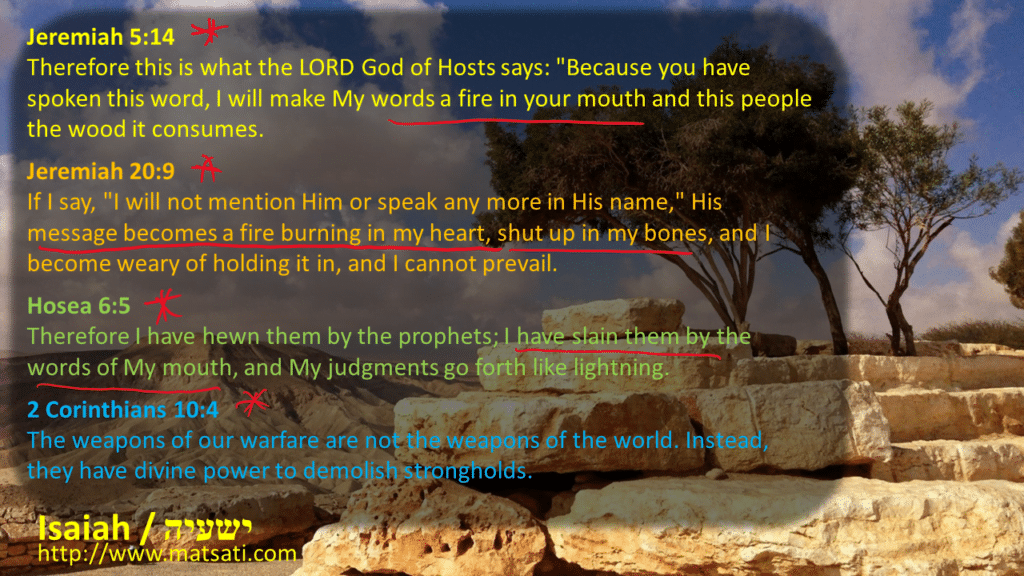
Jeremiah 5:14
Therefore this is what the LORD God of Hosts says: “Because you have spoken this word, I will make My words a fire in your mouth and this people the wood it consumes.
Jeremiah 20:9
If I say, “I will not mention Him or speak any more in His name,” His message becomes a fire burning in my heart, shut up in my bones, and I become weary of holding it in, and I cannot prevail.
Hosea 6:5
Therefore I have hewn them by the prophets; I have slain them by the words of My mouth, and My judgments go forth like lightning.
2 Corinthians 10:4
The weapons of our warfare are not the weapons of the world. Instead, they have divine power to demolish strongholds.
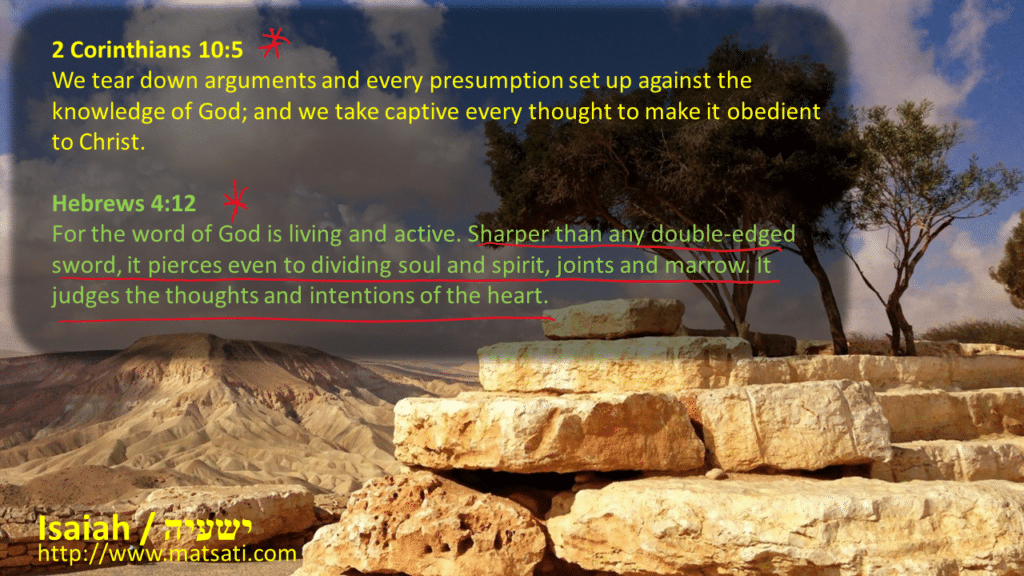
2 Corinthians 10:5
We tear down arguments and every presumption set up against the knowledge of God; and we take captive every thought to make it obedient to Christ.
Hebrews 4:12
For the word of God is living and active. Sharper than any double-edged sword, it pierces even to dividing soul and spirit, joints and marrow. It judges the thoughts and intentions of the heart.
Isaiah 7:19 states, יט וְיֵיתֹון וְיִשרֹון כוּלְהֹון בִרחֹובֵי קִריָא וּבִשקִיפֵי כֵיפַיָא וּבכָל מַדבְרֵי נַעְצוּצַיָא וּבכֹל בָתֵי תוּשבְחָתָא׃ 7:19 And they shall all of them come and dwell in the streets of the cities, and in the clefts of the rocks, and in all deserts full of thorn-hedges, and in all houses of praise. (TgJ) This verse speaks of the nations coming and infesting the land, everywhere they are going, into the clefts, the rocks, the desert, and even in the houses of praise. The rabbis comment upon this in the following way according to the Talmud Bavli Megilla 10b.
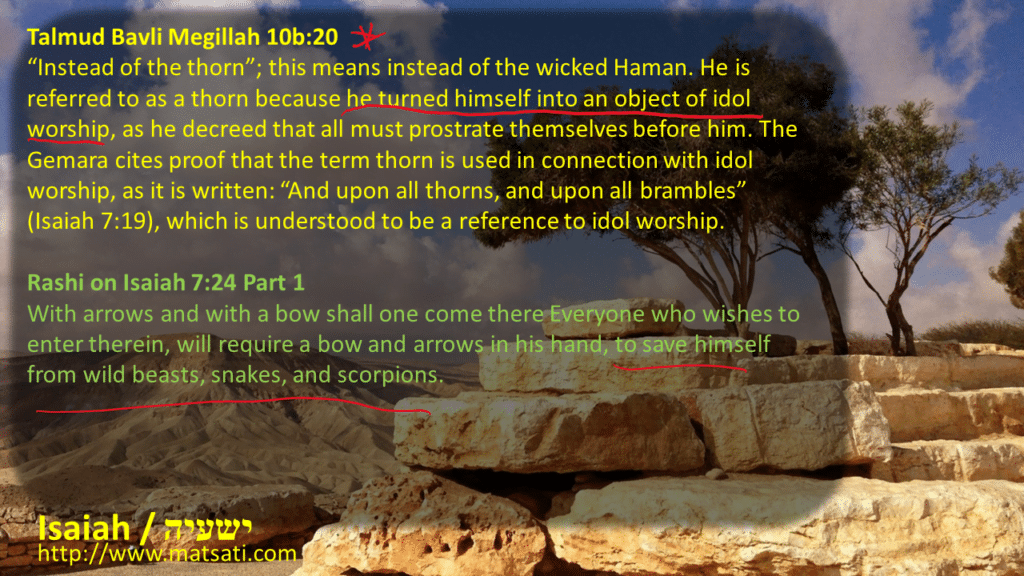
Talmud Bavli Megillah 10b:20
“Instead of the thorn”; this means instead of the wicked Haman. He is referred to as a thorn because he turned himself into an object of idol worship, as he decreed that all must prostrate themselves before him. The Gemara cites proof that the term thorn is used in connection with idol worship, as it is written: “And upon all thorns, and upon all brambles” (Isaiah 7:19), which is understood to be a reference to idol worship.
Note how the analogy that is being made here is to one making oneself an object of worship like an idol. Here thorns are described as to be understood as idol worship. This provides us with a description of something that is incompatible with life. We note how as a farmer we know that these things need to be removed from a garden as they will overgrow the garden and choak the sunlight from the vegetable bearing plants. In addition, this makes it difficult for the farmer to gather the vegetables because of the sharpness of the thistle briars. Isaiah continues describing in Isaiah 7:24 saying, כד בְגִירָן וּבקַשתָן יְהָכוּן לְתַמָן אְרֵי הוּבאֵי וּבוּר תְהֵי כָל אַרעָא׃ 7:24 With arrows and with bows shall men come thither, because all the land shall become briers and thorns. (TgJ) that the land will become infested with dangerous animals and so he must defend himself. By this we may draw in the analogy of the three levels of creation נשמה – נפש – בָּשָׂר where these peoples who infest the land behave as mere beasts not having the neshama the insight and spiritual fellowship that God gives to His people. Rashi states the following concerning these things.
Rashi on Isaiah 7:24 Part 1
With arrows and with a bow shall one come there Everyone who wishes to enter therein, will require a bow and arrows in his hand, to save himself from wild beasts, snakes, and scorpions.
The idea is that one must take weapons of war in order to protect oneself from the wild beasts. The analogy is to have the word of God and entering into the place God wants for us to be, we note there is something that we must do, that is take hold of God’s Word and make it a part of our lives. We note according to Tehillim / Psalms 121:3 the psalmist writes, “He will not let your foot slip—he who watches over you will not slumber.” In verse 7 the psalmist declares, “The LORD will keep you from all harm—he will watch over your life.” The Torah tells us as Israel entered the Promised Land, God promised them that He would never leave nor forsake them. (Devarim / Deuteronomy 31:6) We note how the Lord promises to be with us, to protect us, and to watch over us. These are the promises to those who obey God’s Torah. The Torah blessing comes with God giving us an increase in physical blessing (see Devarim / Deuteronomy 28). This was the basis for our seeking the Lord for help in this world and having faith to believe that He will help us, deliver us, and send a way for us to escape from whatever it is that comes our way! The greatest blessing of all is our relationship with our Father in heaven through faith in Yeshua the Messiah! Then the Lord God Almighty comes to dwell in our hearts via His Holy Spirit. The very same promises are given to those who believe and trust in Him. Paul writes that there is nothing that can ever separate us from God’s love (Romans 8:38-39). In addition, one of the greatest blessings of all is our being given freedom from the dominion of sin in our lives! We are no longer slaves to sinful thoughts, desires, and actions, but are born into a new life of holiness. (Romans 6:22) These are the reasons why Isaiah’s words are so important for us today, as God’s people through faith, we are called to faithfulness, to live according to God’s Holy Word, and to live at peace with all men, showing the love and mercy to others that God has shown to us!
